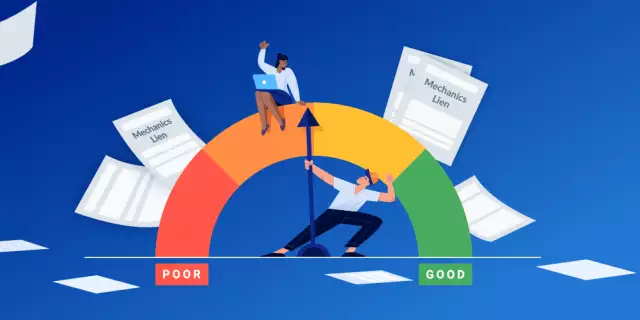
Levelset
Insurance for Electricians: What It Covers & Why You May Need It
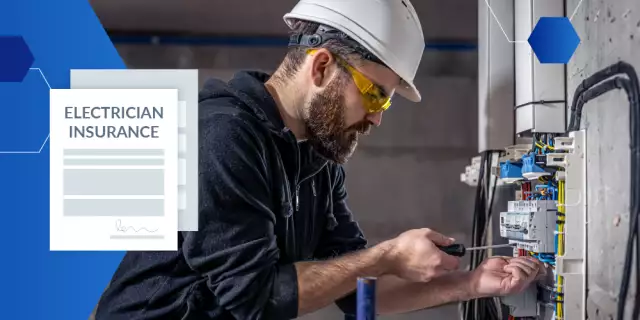
How a Construction-to-Permanent Loan Impacts Contractors & Lenders

17 Alternatives to Common Building Materials
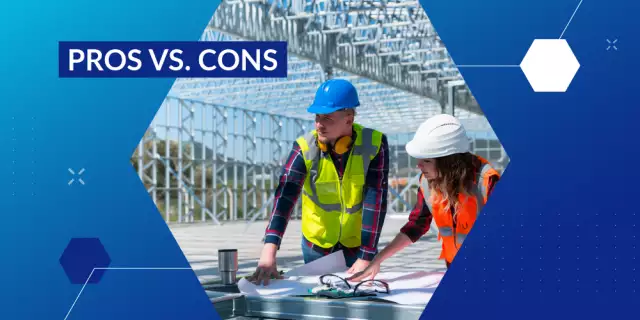
A Plumbing Contractor’s Guide to Insurance Coverage
Plumbing contractors should include business insurance as an integral part of their financial strategy. When you tackle the jobs you’ve secured, it’s also important to plan for the unexpected. With numerous policies available, the plumbing contractor’s insurance landscape offers many ways for you to protect your physical and financial business assets. Obtaining an insurance policy […]
The post A
... morePlumbing contractors should include business insurance as an integral part of their financial strategy. When you tackle the jobs you’ve secured, it’s also important to plan for the unexpected. With numerous policies available, the plumbing contractor’s insurance landscape offers many ways for you to protect your physical and financial business assets. Obtaining an insurance policy […]
The post A Plumbing Contractor’s Guide to Insurance Coverage appeared first on Levelset.
less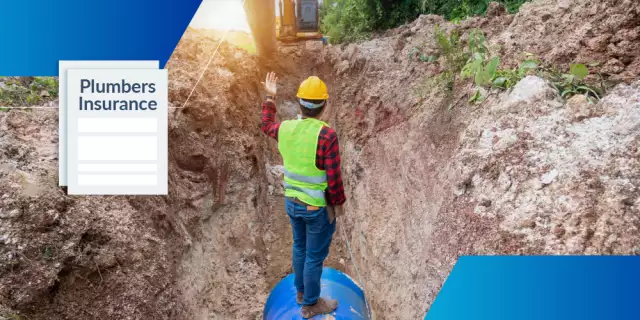
What Is a Certificate of Insurance (COI) for Contractors — and When Do You Need One?
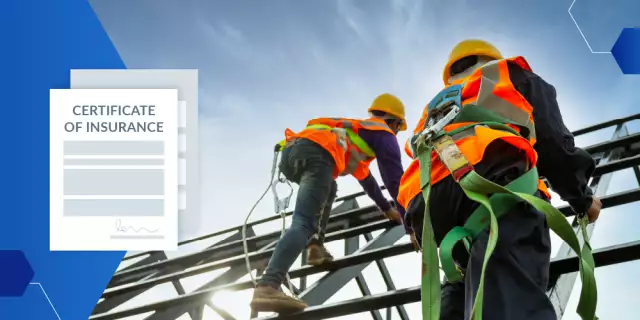
How to Increase Cash Flow for Your Construction Business When You Can’t Get the Financing You Need From the Bank

Carpenter’s Insurance: Who Needs It & Why



Insurance is one part of a strategy to keep your carpentry business financially healthy. You can practice safety and use common sense on the job, but there’s no way to predict when accidents or injuries might occur. To minimize any financial damage, a comprehensive carpenter’s insurance plan is a smart bet.
What is carpenter insurance?
Carpenter’s insurance is a financial instrument that helps protect your business if accidents, injuries, or illnesses occur in a work-related capacity. For protection from financial consequences that could be small or large, you pay a premium to an insurance company for policies that cover many unexpected situations.
There are many policies that apply to a carpenter, but a simple business owner’s policy can include property damage and liability coverage. If you break a window in a customer’s home, property damage coverage helps pay the cost of repair. If a third party gets injured on a job, liability coverage helps pay the cost of legal defense if you get sued for the accident.
Does a carpenter need insurance?
Carpentry is a diverse occupation. During daily operations, any number of accidents could happen on a project. A large claim against your business could have a devastating financial effect that could threaten your livelihood. Having carpenter’s insurance is an affordable way to protect against these potential issues.
To illustrate the need for insurance, you (or an employee) could be nailing a stud in place on the second floor of a new home. The board slips from your grip and strikes the employee of another sub walking below. Injuries are minor but the person needs medical treatment, and your carpenter’s liability insurance will help cover the costs of those medical services.
Insurance serves another purpose. Without an adequate subcontractor insurance plan, you may not be able to land work with a general contractor (GC) or owner. The parties who hire you will want to know that you, and they, are protected in case something goes awry on the job.
What insurance does a carpentry contractor need?
A carpenter’s business owner policy is a good foundation, but you’ll want to explore other policy options that may apply to your business. Here’s a partial list:
Commercial auto insurance: You may operate trucks or vans, and commercial auto coverage enters the mix if you get in an accident with another vehicle or damage a fence on a job.
Inland marine insurance: This coverage protects tools, equipment, or building materials while they are stored on the job, at your business location, or anywhere in transit.
General liability insurance: General liability insurance protects contractors in situations where someone claims the contractor’s work led to bodily injury or property damage. An owner or GC may want you to have this in case you cause an accident or injury on a project. And while it’s not a legal requirement in most cases, in some states it may be required to get licensed.
Professional liability insurance: You may need this coverage if you perform design or consulting services that involve the sale of drawings or blueprints.
Surety bonds: Surety bonds pay out to an owner or GC if you are not able to perform your work per the terms of a construction contract.
Workers’ compensation insurance: If you have employees, a workers’ compensation policy helps them replace lost income and pay for medical treatment if they are injured or fall ill due to job-related conditions.
Cyber liability insurance: This helps cover the cost of recovery or restoration of electronic records if computers or mobile devices are hacked or destroyed.
How do I get carpenter’s insurance?
In most cases, the insurance application process requires basic information about your business. You should be prepared to provide information that includes payroll data, annual revenue figures, and a history of prior insurance claims, if any.
To obtain carpenter’s insurance, you’ll need to contact an agent or broker. You can begin the application process in person at the agent’s office or online applications are also another possibility.
After you give the agent or broker all the necessary information, the application is reviewed by an underwriter. If approved for the policy, you’ll need to remit a down payment to bind the contract, and then you’ll be covered as of the effective date.
How much does carpenter’s insurance cost?
The cost of carpenter’s insurance varies based on many factors. Some of these factors include:
The amount of coverage: To meet the terms of a contract, GCs or owners usually want to see a general liability amount of $2 million. If you choose more coverage, the cost of the general liability coverage will increase. This rule also applies to coverage for business property and vehicles.
Annual revenue: The more work you do, the more money you can expect to pay for carpenter’s insurance. If you have a large operation that takes in $2 million annually, premiums will be higher for you than a company whose revenue is $500,000.
Your geographic location: If you perform work in an area that experiences weather events like hurricanes or flooding, the strong probability that you’ll incur a claim is factored into your premium. Insurance companies look at historical statistics to determine how likely your business is to incur a claim.
Insurance expenses for carpenters will also depend on the type of work you do. Carpenters should clearly define their scope of operations. If you have a shop where you’re making custom woodwork, that pursuit classifies differently from a framer — or a carpenter who does both.
A carpenter can perform a lot of different functions so they need to include all duties in their work description. This helps the insurance carrier to rate the policy properly and ensure coverage applies if a claim does occur.
What other insurance policies can be bundled with subcontractor insurance?
The most commonly “bundled” carpenter’s policy is the business owner’s plan. It includes general liability insurance and business property damage coverages. Often, you can amend this core package to include higher coverage amounts for high-value equipment or endorsements like basic cyber insurance. Commercial auto and workers comp policies must stand on their own, however.
Purchasing carpenter’s insurance does not have to be a complicated endeavor, and the protection you gain will give you and other parties some measure of security. Getting work will also be easier when you can provide valid proof of insurance to an owner or GC.
Nail down your insurance coverage
Carpenter’s insurance can help create a solid financial foundation for your business. If accidents or injuries occur on the job, these policies protect you from associated costs that could cut deeply into your bottom line. There are various policies that address different parts of your operation, and it’s easy to start and maintain a comprehensive insurance plan through any agent or broker.
less
40 Best Construction Podcasts in 2022



Podcasts are now an essential medium for sharing information, and experts across the construction industry share their wisdom every day with listeners interested in growing a construction business, learning about the latest construction trends and technology, and building their understanding of construction law and finance.
Our list of the best construction podcasts of 2022 will help you find shows to help you grow your knowledge, career, and business. Use the table of contents to find shows about the specific construction topic you’re interested in.
Construction career podcasts
1. Laying Foundations
Starting a career in construction is a lot like a construction project. Hosts Davis Hambrick and Walker Lott talk their listeners through career paths, growth, and strategies in episodes of Laying Foundations.
Where to listen: Apple Podcasts | Spotify
Episode runtime: 30 minutes
Release schedule: Weekly
2. The Construction Leadership Podcast
Growing and building a successful construction business requires a deep commitment to leadership. Author and podcaster Bradley Hartmann distills complex leadership topics and interviews industry leaders to share hard-won wisdom about guiding a construction company toward success.
Where to listen: Apple Podcasts | Spotify
Episode runtime: 45 minutes
Release schedule: Weekly
3. The Construction Life
Two guys living the construction life, Manny Neves and Carlito Pavlovic, discuss the wake, work, sleep, and repeat of construction. They interview other pros in the construction industry, talk about trends, and discuss construction techniques in long-form episodes that get to the heart of construction.
Where to listen: Apple Podcasts | Spotify
Episode runtime: 90+ minutes
Release schedule: Weekly
4. Construction Brothers
Eddie and Tyler Campbell are brothers who started working with their dad in the construction industry during their teenage years. Their podcast, Construction Brothers, provides listeners insight into business strategy and industry trends — along with thoughtful commentary on key changes the industry needs to undergo.
Where to listen: Apple Podcasts | Spotify
Episode length: 15+ minutes
Release schedule: Weekly
5. Elevate Construction
Hosted by Jason Schroeder, Elevate Construction aims to do exactly what its name suggests: Build up the industry to a higher standard through interviews and training. Aimed at anyone in the construction industry, this podcast has big ideas for workers and companies looking to better serve their customers.
Where to listen: Apple Podcasts
Episode runtime: 30 minutes
Release schedule: Every weekday
Construction business owner podcasts
6. Construction Leading Edge Podcast
Billed as the best podcast for contractors who want to become leaders and entrepreneurs, The Construction Leading Edge Podcast is hosted by Todd Dawalt. With high-quality interviews and solid tips, the podcast works to help construction business owners grow and succeed.
Where to listen: Apple Podcasts | Spotify
Episode runtime: 30+ minutes
Release schedule: 3x/month
7. People First, Then Construction
The mantra behind People First, Then Construction is simple: Don’t be a jerk. The host Jonathan Cinelli uses his decades of experience training teams and leading projects to communicate the important truths that can help a construction leader understand that how it’s been doesn’t have to be the same as how it could be.
Where to listen: Apple Podcasts | Spotify
Episode runtime: Anywhere between 5 minutes–1 hour
Release schedule: Weekly
8. Disaster Podcaster
Klark Brown is a well-known restoration contractor who shares tips about how to get into — and succeed — in the complex world of restoration work. With interviews, anecdotes, and trends, The Disaster Podcaster is considered the go-to source for restoration contractors.
Where to listen: Apple Podcasts | Spotify
Episode runtime: 1 hour
Release schedule: Weekly
9. Construction Genius
If you want to be a genius, you have to work hard. That’s the guiding spirit behind Construction Genius, hosted by Eric Anderton. In each episode, he presents practical tips for leadership, planning, and business development.
Where to listen: Apple Podcasts | Spotify
Episode runtime: 20+ minutes
Release schedule: Weekly
10. Profit Tool Belt
Contractors who want to learn more about how to market themselves, build their customer base, and get paid should turn no further than Profit Tool Belt. With host Dominic Rubino and guests, listeners of the show learn about how to build a solid contracting business.
Where to listen: Apple Podcasts | Spotify
Episode runtime: 20+ minutes
Release schedule: Weekly
11. Kid Contractor
Caleb Auman is “The Kid” of Kid Contractor, and he has a lot to say after more than 20 years in the construction industry. After growing a business along with his wife, Caleb podcasts several times a week to share wisdom with current and future construction business owners.
Where to listen: Apple Podcasts | Spotify
Episode runtime: 35+ minutes
Release schedule: 4x/week
12. The Art of Construction
The Art of Construction is focused on innovation and creativity in the construction industry. The host, Devon Tilly, brings together experts from across the industry to share thoughts on entrepreneurship in the world of construction.
Where to listen: Apple Podcasts | Spotify
Episode runtime: 45+ minutes
Release schedule: Weekly
13. The Contracting Handbook
Hosted by Mike Knoche, The Contracting Handbook is useful for general contractors and subcontractors alike. By sharing true stories from people in the construction world, the podcast provides valuable information about building a better construction company.
Where to listen: Apple Podcasts | Spotify
Episode runtime: 60+ minutes
Release schedule: Weekly
14. Contractor Cents
Ruth King wants to show contracting businesses how to increase productivity and profit with short, information-packed episodes. In Contractor Cents, listeners can learn about finance, culture, sales, and more with the goal of building stronger construction businesses.
Where to listen: Apple Podcasts | Spotify
Episode runtime: 8–30 minutes
Release schedule: Weekly
Construction safety podcasts
15. The Safety Guru
Eric Michrowski is a world-renowned safety guru, and his podcast focuses on what he knows best: putting wellbeing and safety first. His mission is to show that safety is an investment in people, not a cost on a budget. Each episode focuses on strategies to maintain a safe workplace in the construction industry.
Where to listen: Apple Podcasts | Spotify
Episode runtime: 30–45 minutes
Release schedule: 2x/month
16. On the Safe Side
Produced by Safety+Health Magazine, On the Safe Side is a monthly podcast that explores the most important safety issues affecting the workplace. With a goal to reduce preventable injuries and deaths, this podcast talks with experts to educate business leaders about OSHA guidelines and best practices in safety.
Where to listen: Apple Podcasts | Spotify
Episode runtime: 20–45 minutes
Release schedule: Monthly
17. OH&S SafetyPod
Hosted by Occupational Health and Safety’s editor Sydny Shepard, OH&S SafetyPod talks with industry experts about a variety of health and safety topics that affect millions of people working in construction.
Where to listen: Apple Podcasts | Spotify
Episode runtime: 10–20 minutes
Release schedule: 2x/week
18. CPWR Construction Safety and Health
A project of the Center for Construction Research and Training, CPWR Construction Safety and Health covers the safety climate across the construction industry. The podcast pushes for a return to basic principles when it comes to prioritizing safety, and it uses a data-driven approach to protecting workers.
Where to listen: Apple Podcasts | Spotify
Episode runtime: 10–45 minutes
Release schedule: Monthly
Construction law podcasts
19. The Lien Zone
Alex Barthet is a board certified construction lawyer and a mechanical engineer, making him an excellent fit to host The Lien Zone, which covers technical and legal questions related to construction law. With his deep knowledge and great personality, he gets listeners the information they need to know and helps them enjoy the journey along the way.
Where to listen: Apple Podcasts | Spotify
Episode runtime: 10–50 minutes
Release schedule: Weekly
20. Construction Law Today
The world of construction law can seem daunting and ever-changing, but the Construction Law Today podcast from the American Bar Association helps to keep construction professionals at the top of their game. With discussions about every facet of construction law, this podcast is an infrequent but welcomed primer on difficult topics made simple.
Where to listen: Apple Podcasts
Episode runtime: 30 minutes
Release schedule: 6x/year
21. The Construction Briefing
Construction law isn’t just statutes and codes — it’s about situations that arise in the complex world of construction. The Construction Briefing, produced by Thomson Reuters and hosted by Michelle Rousell and Yassir Mahmood of Practical Law Construction, helps to show how complicated laws play a role in everyday construction. From building safety to payments and adjudication to collateral, this podcast lays out what listeners want to know about construction law.
Where to listen: Apple Podcasts | Spotify
Episode runtime: 1 hour
Release schedule: Monthly
22. Law and Mortar
Trent Cotney and John Kenney are the hosts of Law and Mortar, the hilariously named but endlessly educational construction law podcasts. They cover everything to do with the legal issues that affect construction safety, profitability, and business.
Where to listen: Apple Podcasts | Spotify
Episode runtime: 15 minutes
Release schedule: 2x/month
Construction trades podcasts
23. Power to the Trades
Hosted by various members of the eSub team, Power to the Trades discusses how trade contractors can up their game with new technology. With a different focus every month, as well as real-life stories from contractors, this podcast presents practical advice for doing better work with better tech.
Where to listen: Apple Podcasts | Spotify
Episode runtime: 30 minutes
Release schedule: Monthly
24. Talkin’ Trades
Along with hosts Randy Beall of Georgia Construction Careers and Rut Walker from Union Up, listeners of Talkin’ Trades get an inside look at how to grow a career as a trade contractor. They interview guests and talk about safety, performance, and many more issues affecting trade contractors day to day and over the course of their careers.
Where to listen: Apple Podcasts | Spotify
Episode runtime: 15–60 minutes
Release schedule: 6x/year
25. Skilled & Sober
The host and creator of Skilled & Sober, Garrett Davis, is passionate about bringing awareness to the issue of drug and alcohol addiction in the construction industry. With a focus on healing and recovery, each episode shares a guest’s personal story about addiction — and how much it takes to overcome.
Where to listen: Apple Podcasts | Spotify
Episode runtime: 90 minutes
Release schedule: 6x/year
Construction technology podcasts
26. Construction Revolution
The Construction Revolution podcast places its focus squarely on the technology that’s revolutionizing the construction industry. From software to hardware — and even amazing innovations like robotics — the podcast covers developing trends in construction tech.
Where to listen: Apple Podcasts | Spotify
Episode runtime: 30 minutes
Release schedule: 6x/year
27. Data in Construction
Construction may seem like a mainly physical task at first, but behind the scenes, there are thousands of pieces of data: materials, designs, change orders, labor hours, budgets, and more. Data in Construction, hosted by Hugh Seaton, takes a deep look into how to manage all of that data for a more effective job site.
Where to listen: Apple Podcasts
Episode runtime: 30 minutes
Release schedule: 2x month
28. The Construction Dorkcast
Nerds may not be the first thing you think of when it comes to construction, but a group of passionate technology nerds calls themselves The Construction Dorkcast, looking for ways that technology can move the industry forward. With monthly episodes covering every aspect of technology, this group of nerds has big ideas for reshaping construction.
Where to listen: Apple Podcasts | Spotify
Episode runtime: 1 hour
Release schedule: 2x month
29. The ConTechCrew
The crew at ConTechCrew has a guiding motto: The future is built. Nearly everything we interact with every day is built with, and innovations that make building easier, cheaper, and better will change all of our lives. Host James Benham covers hardware, software, devices, apps, and more in this highly rated construction technology podcast.
Where to listen: Apple Podcasts | Spotify
Episode runtime: 1 hour
Release schedule: Weekly
30. Construction Disruption
Construction is a $1.5 trillion industry that’s ready for a huge explosion in technological innovation. Construction Disruption has the inside scoop on the ever-evolving technologies and trends that are pushing construction toward a new horizon.
Where to listen: Apple Podcasts | Spotify
Episode runtime: 30 minutes–1 hour
Release schedule: Weekly
31. Future Construct
Host Amy Peck takes listeners of Future Construct into imagined futures where augmented reality and other emerging technologies are the norms for the construction industry. With expert guests and a rotating focus on dozens of upcoming technologies, this show is an excellent starting point for anyone looking to see how technology could reshape construction in the coming years.
Where to listen: Apple Podcasts | Spotify
Episode runtime: 30–90 minutes
Release schedule: 2x month
32. Automate Construction Podcast
Automation is changing nearly every industry, and construction is no exception. The Automate Construction Podcast gives a closer look to listeners interested in how 3D printed construction, parametric design, and other AI-driven technologies are weaving their way into the construction industry.
Where to listen: Apple Podcasts | Spotify
Episode runtime: 30–90 minutes
Release schedule: Weekly
33. The Construction Engineering Show
Host Bob Hildebranski is a licensed professional civil engineer who has been working in the construction industry for more than 30 years — more than long enough to see how it’s changed and is continuing to change. Episodes focus on the underlying techniques that engineers use to build safe and practical buildings every day.
Where to listen: Apple Podcasts | Spotify
Episode runtime: 30 minutes
Release schedule: Occasionally
Construction trends podcasts
34. Digital Builder
Produced by industry leader Autodesk, the Digital Builder podcast takes a monthly look at the trends on the forefront of construction. With focuses on legal changes, training, technology, strategy, and more, episodes take listeners on a journey to a better understanding of what’s new in construction.
Where to listen: Apple Podcasts | Spotify
Episode runtime: 45 minutes
Release schedule: Monthly
35. Constructed Futures
The Constructed Futures podcast, hosted by Hugh Seaton, is a weekly dive into trends in construction finance, technology, and productivity. Featuring guest interviews, each episode looks closely at industry trends that are affecting every facet of the building process, from financing through building.
Where to listen: Apple Podcasts | Spotify
Episode runtime: 30 minutes
Release schedule: Weekly
36. The Construction Corner Podcast
Dillon Mitchell and Matt Vetter interview guests from the construction industry in their Construction Corner podcast. They’ve covered entrepreneurship, trades, technology, and more in their podcast — even putting out episodes encouraging young people to enter the industry.
Where to listen: Apple Podcasts | Spotify
Episode runtime: 30 minutes – 1 hour
Release schedule: Weekly
37. Mass Construction Show
Joe Kelly is the host of Mass Construction Show, which covers many aspects of construction, including risk management, real estate, and technology. While he does occasionally focus on Massachusetts in particular, the content is typically aimed at anyone interested in the construction industry at large.
Where to listen: Apple Podcasts | Spotify
Episode runtime: 5 minutes–2+ hours
Release schedule: Weekly
38. Mass Timber Construction
The trend of mass timber construction is sweeping the globe, and host Paul Kremer reports twice a month with updates. As an alternative to steel and concrete construction, mass timber has a number of advantages, which each episode lays out along with up-to-date information about prices, techniques, and more.
Where to listen: Apple Podcasts | Spotify
Episode runtime: 10 minutes
Release schedule: Weekly
39. The Connected Construction Show
The Connected Construction Show looks at emerging trends and technologies like BIM and blockchain through the eyes of host Matt Sprague and his many industry guests. Listeners who check in for each new episode are greeted by updates on the major trends shaping the construction industry.
Where to listen: Apple Podcasts | Spotify
Episode runtime: 30 minutes
Release schedule: Weekly
40. Bridging the Gap
Sustainability, marketing, modular construction, lean construction, and more are covered in Bridging the Gap, which has the goal of taking abstract concepts and bringing them to real-world construction projects. Host Todd Weyandt has made it his mission to share practical tips to bridge the gap between theory and practice for construction professionals.
Where to listen: Apple Podcasts | Spotify
Episode runtime: 45 minutes
Release schedule: Weekly
less
Does GC Insurance Cover Subcontractors?



Accidents happen, especially in construction. Between miscommunication, the wrong specifications, carelessness, or events out of anyone’s control, things can go wrong, and the damages can be expensive. General contractors know these risks when they take the role. Luckily, that’s what insurance is for, right?
But what if the general contractor isn’t at fault, and a subcontractor is to blame? Does a general contractor’s insurance cover their subcontractors’ accidents or mistakes? While there isn’t a cut-and-dry answer to these questions, we’ll take a deeper look into insurance coverage and what happens in these situations.
Who is covered by an insurance policy?
At their core, insurance policies are agreements between two parties: the insurer and the policyholder.
The policyholder is the primary beneficiary of the policy. What this means is that financial losses caused by accidents, mistakes, and other issues that are the fault of the general contractor will be covered under the policy. This is the case when the losses impact only the contractor or sub holding the policy, or when a mistake affects a third party.
If a sub accidentally drops a steel beam on the project manager’s new sports car, that subcontractor’s liability insurance policy would likely cover the damage. The car owner can’t go after a different contractor’s insurer for the damage.
GC insurance & subcontractor coverage
Most general contractors and subcontractors are required to carry an insurance policy in order to to obtain a contractor license. However, the types of policies and their limits (the maximum amount claims can pay out) are limited.
However, with the amount of risk involved in a standard construction project, general contractors typically need to hold multiple policies. General liability, builder’s risk, and subcontractor default insurance are among the most common, and wrap insurance is growing in popularity.
Let’s take a look at each of these policy types — and whether or not a GC’s insurance will cover their subcontractors.
General liability insurance
Verdict: A contractor’s general liability insurance typically does not cover subcontractor damage.
A general liability insurance policy protects the policyholder from claims of property damage or bodily injury caused by the contractor or its employees. This policy may also cover legal fees involved in certain types of lawsuits. The contractor (policyholder), the property owner, or a third party unrelated to the problem may file a claim against the policy.
For example, if a plumbing contractor accidentally damages the foundation of the building they’re working on, their general liability insurance policy will likely cover it. Or, if that same contractor damaged the neighboring structure while in the course of their work, they could submit a claim through their general liability policy.
General liability is the most common type of insurance carried by construction companies. It affords the contractor some stability against financial stress, helping them continue to provide quality service. It also gives the property owner a safety net against mistakes or accidents caused by the contractor.
A general contractor may add a subcontractor as an additional insured entity under their policy, but this isn’t very common.
Builder’s risk insurance
Verdict: Builder’s risk insurance may cover subcontractor damage in some situations.
When a contractor or project owner wants to protect the structure against risk, they can purchase a builder’s risk insurance policy. Builder’s risk insurance protects the building while it’s under construction or renovation, allowing the policyholder to recoup losses caused by accidents, fires, weather, vandalism, theft, or other risks named in the policy. Clearly, the work of the subcontractor will be covered, though damaged or stolen equipment may be on a case-by-case basis.
There are certain damages that a builder’s risk insurance policy won’t cover. Events like damage to tools and equipment, faulty building design, or defective materials typically aren’t covered in a builder’s risk policy. For this reason, it’s an add-on policy that many contractors carry in addition to their general liability insurance.
Subcontractor default insurance
Verdict: SDI covers the policyholders against subcontractor failures.
Subcontractors don’t always do what they’re supposed to do, and the financial implications can be significant. Contractors can protect themselves from these risks by purchasing subcontractor default insurance.
Subcontractor default insurance protects policyholders against the financial losses caused by a default of performance of a subcontractor. For example, if a sub-sub fails to complete their obligation and causes schedule overruns, necessitates hiring a new sub, or causes another ripple effect, the policy will cover the costs associated with the failure. These policies can serve as alternatives to performance bonds, or as a supplement to a surety bond.
Wrap policies (OCIP/CCIP)
Verdict: Wrap policies typically provide general liability insurance to everyone on the project, including subcontractors.
In situations where the project owner or general contractor prefers not to worry about the potential of uninsured subs, they may purchase a wrap policy, known as a controlled insurance program (CIP).
A CIP provides everyone on the project with general liability insurance, allowing some subcontractors to forgo carrying their own policy. In some cases, a wrap policy may even include worker’s compensation coverage.
There are two forms of wrap policy: OCIP and CCIP. An OCIP stands for Owner Controlled Insurance Policy, while CCIP stands for Contractor Controlled Insurance Policy. They are essentially the same policies and offer the same coverage — the main difference being who purchases the policy.
There are several reasons contractors and owners purchase a wrap policy for a project. First, it helps ensure that any accidents or mistakes are handled smoothly. Since one insurer provides coverage, multiple companies won’t be fighting over responsibility for payment. Also, a wrap policy may allow a project owner or general contractor to avoid penalties for hiring uninsured subcontractors.
Bonds and subcontractor coverage
While insurance protects the policyholder from loss due to accidents and mistakes, a bond is quite different. A construction bond is a three-party agreement between the principal (i.e. the contractor), the surety, and the obligee (i.e. the person hiring the contractor).
The bond is purchased by the contractor and protects the property owner from financial risk. A GC’s performance bond protects the owner from non-performance of the prime contract. A payment bond protects the owner’s property from mechanics lien claims in case a subcontractor or other party doesn’t receive payment.
A contractor’s bond typically does not cover the actions of subcontractors unless they are specifically named on the bond. In practice, if a subcontractor defaults on a critical path task, it could cause the GC to default on their prime contract and lead to a claim on the bond.
How to ensure subcontractors are covered
The effects of accidental damages and injuries can sidetrack a project or result in financial doom. For those reasons, general contractors and project owners need to ensure they are protected against subcontractor mistakes or damage.
Luckily, ensuring subs have coverage isn’t necessarily challenging. Project owners can require the general contractor to purchase a subcontractor default insurance policy, while also providing proof of their own coverage. Or, general contractors can require subcontractors to provide proof of their insurance policy, and the general contractor can keep track of subcontractor policies along with other compliance documents.
If an owner or GC wants to use a bond to protect against subcontractor default, they can name them on the GC’s bond, or require them to purchase a subcontractor performance bond.
However, one of the most surefire ways to ensure that everyone on the project has insurance coverage is to purchase an OCIP or CCIP wrap policy. These policies cover everyone on the project, allowing for a collaborative approach to insurance for better protection.
less
Top 8 Construction Health and Safety Hazards — and Ways to Protect Your Jobsite



In the construction industry, a lot can go wrong with the progress and completion of the structure itself. By the same token, many potential situations pose risk to the health and safety of your employees and others working on the jobsite. Hazardous conditions can have both short-term and long-term financial consequences along with the possibility of work-related illness or injury.
The Occupational Safety and Health Administration (OSHA) and the American Industrial Hygiene Association (AIHA) have both developed “Focus Four” lists that highlight job hazards that can have long-term negative effects on the health of your employees and your construction business.
Here’s an overview of eight of the top safety and health hazards in construction — and preventive measures and resources contractors can use to mitigate these risks.
1. Falls
It’s no secret how dangerous — and unfortunately prevalent — falls are. According to data from the Bureau of Labor Statistics, falls accounted for more than 1 in 3 jobsite fatalities in 2019.
Falls trigger a lot of OSHA safety inspections, and they account for half of the top 10 violations in construction. Many of the accidents stem from oversights that could have been prevented with more vigilance on the job. You must be wary of these hazards and make prevention a part of your formal safety program.
OSHA requires that holes in walking surfaces and skylight areas six feet or higher above a lower level must be protected by covers, guardrails, or fall arrest systems. Guardrail installation also applies to stairs, runways, and ramps situated six feet above a lower level. Establishing and enforcing these guidelines as part of your daily operations can significantly reduce the number of falls on the job.
2. Getting caught in or between
Getting caught in a piece of machinery or caught between a piece of heavy equipment and the ground or a wall could result in the loss of life or limb. Clothing or jewelry can get tangled up in an unprotected pulley or conveyor system, while unguarded trenches pose risk for collapse and crushing injuries or suffocation.
To reduce the risk of injury or death, contractors must train employees to be aware of heavy equipment during operation and refrain from wearing loose clothing or apparatuses attached to the body that can get caught up in moving machinery parts. Workers should also stay clear of the radius of operation for devices such as fans, drive belts, or come-alongs, for example.
3. Struck-by accidents
Head, neck, or bodily injuries and death most often occur when workers use power tools, walk beneath elevated work areas, and situate themselves near improperly stored building materials. “Struck-by” fatalities numbered 170 in 2019, accounting for 15.4% of all deaths in the construction industry. According to OSHA, “approximately 75% of struck-by fatalities involve heavy equipment such as trucks or cranes.”
Prevention and risk avoidance remain top priorities for your contracting business. Among the top safety measures implemented in your daily operations, you should ensure that all loads being moved are secured, caution employees to steer clear of suspended loads and overhead work, and strictly enforce the use of personal protective equipment (PPE), such as hard helmets and safety glasses.
4. Electrocution
Powered-up equipment and electrical lines stand out as two principal risks on a jobsite. Inadvertent contact with exposed or hot wires or improper operation of energized machinery hold obvious peril for employees who have not undergone necessary safety training.
According to CPWR, The Center for Construction Education and Training, electrical contractors account for about 32% of electrocution fatalities. The risk is highest for power line installers, who have the highest rate of electrocution death of any occupation.
Part of your formal safety program aimed at reducing burns or electrocution must require that workers wear clothing and PPE that includes boots, gloves, long-sleeved garments, and face shields. Keeping a safe distance from power lines and marking areas where powered equipment is in use will also help minimize the risk for electrical accidents. You should also ensure that electrical equipment is adequately powered down and completely shut off.
5. Manual material handling
AIHA cautions construction companies that moving building materials and equipment manually can lead to health complications. Pushing, pulling, holding, and carrying construction items often places employees in awkward and unnatural positions that can cause musculoskeletal disorders (MSD).
These injuries often result in missed time or permanent incapacity. Financial distress can result from a lack of skilled labor and possible workers’ compensation insurance claims.
Some methods to avoid MSDs involve dropping materials as close as possible to where they’ll be deployed or installed. Heavy loads should be transported by carts, dollies, and lifting tables. Innovative tools that cut down on muscle strain and overexertion should replace less modern items. Analyze work processes to identify how efficiency and proper ergonomics can be optimized.
6. Noise
It’s no secret that construction jobsites are noisy. But that noise can be more than a simple annoyance: High levels of noise exposure can cause permanent hearing loss. The impairment occur gradually without an employee recognizing that damage is occurring. While other injuries can often be corrected, hearing loss is neither reversible nor curable. Thus, prevention becomes a key concern for your construction employees.
Employees may be unaware of unsafe noise levels, so continual detection helps reduce the chance of hearing loss. According to OSHA Standard 1910.95, the permissible noise exposure limit for an 8-hour shift is 90 dbA (A-weighted decibels) — similar to the noise level of a leaf blower or a music concert. (A 2000 report from the Workers Compensation Board of British Columbia found that nearly all construction equipment operates at or above 90 db.) If employees are exposed to noise above established limits, employers must provide personal protective equipment such as adequate ear protection.
If the time-weighted average (i.e., sound levels averaged over the work period) exceeds 85 A-weighted decibels, OSHA requires employers to notify employees, monitor noise levels, and implement a hearing conservation program, among other requirements.
7. Air contaminants
Construction workers are often exposed to fumes, vapors, gases, dust, and other contaminants on the jobsite. These contaminants are inhaled through the mouth and nose, the most common routes of entry. Though less common, swallowing hazardous airborne particles must also be accounted for in safety protocols. According to a CDC survey in 2010, more than half of all construction workers report at least two exposures weekly to such contaminants.
One common contaminant, crystalline silica, is found in masonry and concrete products. Exposure to silica may result in a condition known as Silicosis, which can lead to respiratory disease and even death.
PPE becomes an integral part of how contractors manage risk of air contamination. Masks and respirators must be used where contaminants come into play. Monitoring constantly changing unsafe levels of contaminants helps drive new safety protocols while adequate ventilation in closed spaces also helps lessen the chance that employee health issues can arise.
Planning for contaminants allows you to provide employees with the appropriate barriers to possible illnesses and injuries.
8. High temperatures
Construction work in hot climates can have severe health implications when overexposure factors into the equation. Heat stroke is one of the most common conditions that you must prevent when working in extreme temperatures.
Dangerously, heat stroke is often difficult to diagnose. Afflicted workers are typically suffering from impaired judgment and have trouble describing their symptoms. Contractors should create a plan for recognizing and treating symptoms work is done in full sun and the heat index rises.
OSHA recommends several steps to reduce heat illness on the jobsite:
This is especially important for new employees who haven’t acclimatized to working in the heat. OSHA reports that nearly 3 in 4 heat-related fatalities occur during the first week of work. As a result, they recommend the “20% Rule:” On a worker’s first day, don’t allow them to work more than 20% of their normal shift in the full heat intensity. Increase their work time by no more than 20% each day until they acclimatize to the working conditions.
The true cost of health & safety hazards
Besides the obvious humane angle, there are many financial risks that come with health and safety hazards on the job.
Lost days at work can impact the scheduled timeline and projected profitability of a job. Skilled labor will be more difficult to come by if your company has a track record of unhealthy and unsafe business practices. Higher volumes of workers’ compensation claims will cause policy premiums to skyrocket, adding yet another unwanted expense to your operations.
And while the timely completion of a project is critical, nothing holds more importance than the safety and well-being of your employees.
Read More: Common Construction Risks and How to Manage Them
lessInsurance for HVAC Contractors: What It Covers and Why You Need It



Heating, ventilation, and air conditioning (HVAC) contractors must protect their business property while reducing the odds that a job-related accident or injury could financially harm their business. Damaged or stolen tools and equipment can erase a considerable investment, and bearing responsibility for damage to another person’s property can mean significant costs for an HVAC business.
HVAC contractor insurance is the primary way to help protect your financial interest if things go wrong on the job. A business policy covers many common hazards and perils you might face during the course of construction. This contractor’s insurance solution is typically the most cost-effective means to secure coverage and give you peace of mind.
What is HVAC contractor insurance?
HVAC insurance takes the form of a business insurance package commonly offered by all carriers that issue contractor policies. The policy will help indemnify your business or another party if either of you suffers some financial loss due to a work-related accident, theft, illness, etc.
The policy includes two main components that help protect the financial standing of the business. Business property insurance covers the value of materials you own to perform your job. Liability insurance will help cover expenses for damage to someone else’s property and/or legal costs if another party decides to file a lawsuit.
Unique situations could arise for HVAC contractors when installing heating units in residential or commercial buildings. A faulty connection in a heating unit could lead to a fire that results in minor or major property damage. In either case, your HVAC policy will help cover the cost of replacement or repair for the owner of the project if you or an employee is found to have some fault in the cause of the accident.
Who needs HVAC insurance?
If you work on a job with a general contractor, the contract itself may require that all subcontractors have insurance before the job can begin. This requirement helps assure project owners that all parties have proper coverages in place. The contract may ask that each sub carry a liability amount of $2 million, for example. Often, this amount will exceed the total cost of the project for the owner’s optimal protection.
As you can see from the liability amount that could be contractually required, a catastrophic loss can severely harm an HVAC business if insurance is not in place. If you were found responsible for the cause of significant property damage or personal injury during your business operations, legal expenses and possible jury awards could drain much, or all, of your business assets.
Insurance Policies HVAC contractors need
You can tailor an HVAC business insurance program to meet your needs. Policies cover a number of other situations beyond basic liability and business property coverage.
How do I get HVAC insurance?
To get an HVAC contractor’s policy, the insurer will ask for specific information. Aside from contact info and an employer identification number (EIN), the company might require payroll and sales information. Often, policy rates are derived from one of these two factors. If you currently have HVAC insurance, the carrier may also ask for a claims history related to your account.
To buy a basic HVAC policy, you can contact an insurance agent or broker who can guide you through the application process. If your needs reach further than what a core policy provides, the insurer may ask for additional information such as a stated value of tools and equipment, a financial statement, and credit history. After the carrier evaluates your business situation, the policy gets issued.
How much does HVAC insurance cost?
The cost of HVAC insurance depends on a few variables, including:
Your annual policy cost for HVAC insurance will likely have a minimum premium, even if you have a small operation. The minimum premium may average around $1,000 per year and escalate as any of the above factors dictate. HVAC insurance costs trend toward the lower side in most cases, as this business typically presents a low risk to an insurance company.
Taking the next steps to get insured
HVAC contractors tend to find insurance policies affordable. A broad spectrum of insurance solutions exist to fulfill your needs and obligations. Nearly every Property and Casualty broker and agent can customize a package that suits your business style and operation, and insurance stands as a critical protective measure you shouldn’t run without.
less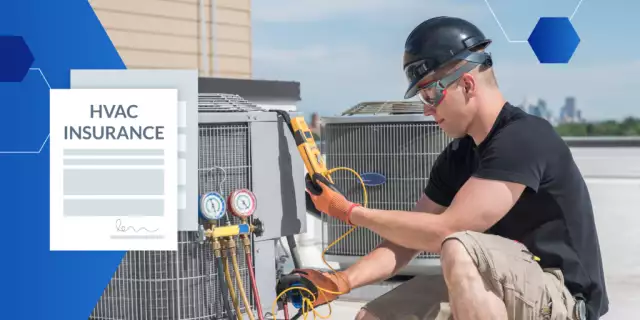
Job Safety Analysis (JSA): What It Is and How to Do It
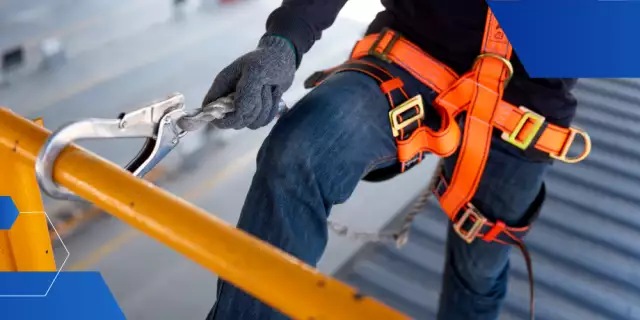
First-Party vs. Third-Party Insurance: What’s the Difference?


As you dig deeper into your construction insurance policy, you may come across the terms first-party insurance and third-party insurance. Mastering the difference between these two concepts is crucial to understanding how different types of construction insurance protect you. Fortunately, the difference is very straightforward.
First-party insurance provides compensation directly to the insured individual or business, whereas third-party insurance provides compensation to another party when the insured person or business is liable for damages.
Read on for more everything you need to know about first-party vs. third-party insurance in construction.
The difference between first-party and third-party insurance
First-party insurance provides compensation directly to the insured individual or business. For example, if your insurance policy covers your equipment, any damage that is covered will lead directly to you getting reimbursed for repairs or replacement.
Third-party insurance, also known as liability or casualty insurance, protects insured individuals or businesses in situations where they may be liable for damages to another person or business — the third party. For example, if you damage a customer’s property while performing electrical repairs, liability insurance may cover the cost of damages to the customer’s property.
| First-party insurance | Third-party insurance | |
| Definition | First-party insurance provides reimbursement to the insured individual or business for covered claims during the coverage period. | Third-party insurance provides compensation to other individuals or businesses (third parties) when the insured individual or business is liable for damages. |
| Common contractor policies | Commercial auto, commercial property, and builder’s risk | Workers’ compensation, general liability, and professional liability |
| Example | A building in progress, insured by builder’s risk insurance, is damaged by a fire. The general contractor who has an insurable interest in the property is reimbursed for damages. | A customer trips on a ladder belonging to a roofer on a residential job site. The roofer’s general liability insurance covers claims related to injuries related to the customer’s fall. |
A simple way to think about first-party and third-party insurance coverage is to ask yourself the following question: Who ultimately receives the financial compensation from the policy?
With first-party insurance, the policyholder receives compensation, but with third-party insurance, someone else that the policyholder is liable to receives compensation.
However, both forms of insurance are known as risk transfer policies in construction insurance because they shift unknown future costs away from the policyholder and onto the insurance company — an excellent prospect for contractors working in complex and risky fields.
First-party insurance examples
There are a number of first-party insurance policies that are common in the construction industry. Taking a closer look at each type of policy makes it easier to understand how the first-party — the policyholder — is reimbursed for particular types of claims.
In these and other cases involving first-party policies, the construction business is receiving reimbursement directly for claims that are covered by the policy.
Third-party insurance examples
The two most common third-party insurance policies in construction are general liability insurance and professional liability insurance, also known as errors and omissions (E&O) insurance. Both of these policies cover contractors in situations where their work leaves them potentially liable for damages to a third party.
Liability insurance is vital for most construction businesses, as the financial losses that come from a liability claim — including potential legal fees and settlements — can be significant. Although the compensation these policies provide goes to third parties, the policyholder benefits by mitigating the risk of massive financial losses from a liability claim.
In this way, third-party insurance is similar to bonds, which many construction businesses are required to have when working on government projects.
For example, payment bonds are purchased by general contractors to ensure that subcontractors are paid for their work — protecting owners from potential lawsuits. And performance bonds, which are purchased by subcontractors, ensure that work will be completed for the GC and owner, even if the subcontractor leaves the job unfinished. In both cases, a third party (not the contractor who secured the bond) receives the benefit of the bond, which effectively functions as a form of insurance.
Bad faith insurance claims
When a policyholder makes a claim with their insurance carrier, the carrier has a responsibility to investigate the claim and provide payment if obligated. This responsibility exists for both first-party and third-party insurance policies, since either kind of claim could result in compensation for the affected party.
If a contractor believes that their insurance carrier has misrepresented contract terms, willfully avoided providing reimbursement, or is otherwise failing to live up to its contractual obligations, they are generally able to file a claim that the insurance carrier is acting in bad faith.
Importantly, an insurance company that has made a simple mistake or has correctly denied a claim based on the contract cannot be held in bad faith. Additionally, not all states have laws enabling policyholders to make bad faith claims. In some cases, states allow for bad faith claims for first-party claims but not third-party claims, so it’s best to consult a construction attorney for more information about your specific situation.
Construction insurance coverage is key
With a firm knowledge of first-party and third-party insurance, you’ll be able to take a closer look at specific construction insurance types and the benefits they provide to construction businesses.
While the initial cost of construction insurance may seem burdensome, the ability to mitigate risk, avoid costly liability claims, and get reimbursed for covered damages ultimately helps contractors stay in business.
less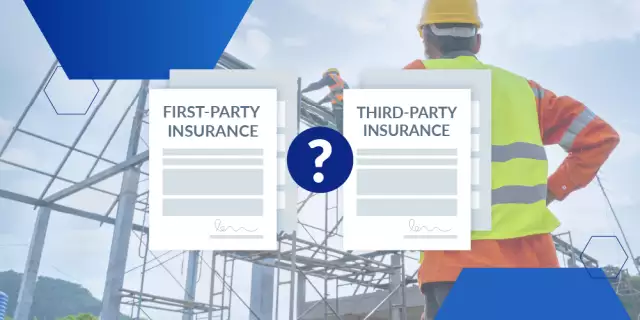
Completed Operations: A Contractor’s Guide to Coverage, Cost, & More
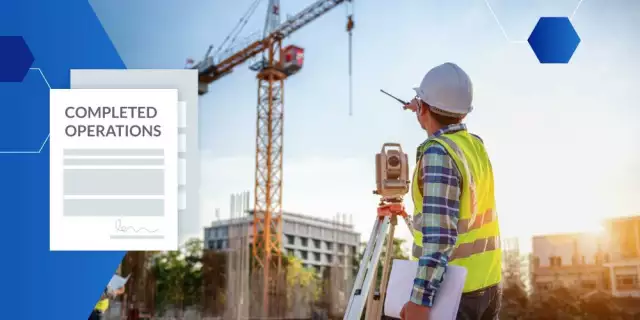
What is Equipment Floater Insurance for Contractors?
CCIP & OCIP: A Guide to Controlled Insurance Programs in Construction

9 Tips for Starting an Architecture Firm

A Cash Flow Guide for Architects

Overcoming Construction Labor Shortages to Grow Your Business
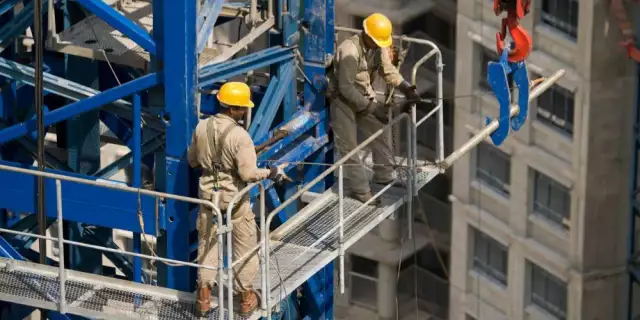
Types of Capital for Construction Businesses



Construction companies need capital to get off the ground, stay in business, and keep growing. The term capital is used across industries to represent all of a company’s financial assets, including cash, inventory, equipment, and more.
Several different types of capital — working capital, debt capital, and equity capital — are common in the construction industry. Construction companies need a solid understanding of capital to run a successful business.
In this article, we’ll explain what construction businesses need to know about the different types of capital available — and how to use them.
What is capital?
Capital is a fundamental financial concept meaning anything that is able to generate value. Money, for example, is a basic form of capital because it can be used to invest and create more wealth. But capital can take many other forms: Human capital, for instance, is labor that can build wealth. Construction businesses may have equipment, materials, or technology that function as capital, too.
However, when most construction companies think about capital, they are almost always thinking about cash. That’s because other forms of capital — like labor or equipment — can’t generate value if you don’t have enough cash to take on new jobs, acquire materials, or cover overhead.
Joshua Leyenhorst, a CPA at BasePoint who has worked with many construction companies, defines capital like this: “Capital is all of the financial resources available to start or maintain a construction company, including working capital, debt capital, and equity capital.”
Each type of capital has a specific purpose for construction businesses as they get started or look to grow.
3 types of capital for construction
Construction companies need to know the differences between the three types of capital and why each one is useful for managing and growing a business. For most businesses, working capital will be front of mind, but debt capital and equity capital serve important purposes as well.
1. Working capital
Working capital measures the difference between a construction company’s current assets and current liabilities. In other words, working capital highlights the financial prospects of a business in the short term.
Businesses whose assets (like cash, accounts receivable, inventory, or materials) exceed the value of their liabilities (like wages, debts, vendor payments, or overhead costs) have working capital to use to maintain or grow. On the other hand, companies that have liabilities exceeding their assets lack working capital and may have trouble making payments and staying afloat.
“Working capital evaluates the financial resources a company requires to operate the company,” notes Joshua Leyenhorst. “It’s something business owners need to consider over the course of the next year of operations. Many companies are only thinking in terms of the next month — the next two payroll periods or upcoming vendor payments — but stable companies typically have sufficient cash forecasts to project their working capital further out.”
Working capital is the lifeblood of a construction business. Because payment for construction jobs may be weeks or months after work is already completed, companies must manage their finances carefully to maintain cash reserves for taking on new jobs.
Learn more: How to calculate working capital in construction
In certain situations, a company’s best option is to employ debt capital to finance certain expenditures, which helps keep working capital intact.
2. Debt capital
Debt capital is funding that a construction business acquires by borrowing, typically from banks or other lending institutions. By taking on debt, construction companies can defer payment on large purchases and use cash reserves for more immediate costs, like employee payroll or purchasing materials for a new job.
“In construction, debt capital is often used to purchase so-called ‘capital assets,’ which would include equipment, vehicles, and real estate,” says Joshua Leyenhorst. “Often, the case is pretty strong to use debt financing for long-term assets, which frees up cash for operating expenses. However, companies need to be on the lookout for lender covenants or other restrictions that may make debt capital less attractive.”
Construction companies, just like individuals, need a credit history in order to borrow money. Frequently, companies start with a business credit card or another small line of credit that they pay back consistently in order to increase their creditworthiness. That way, as the need for credit increases, a business already has a demonstrated history of paying back debt.
Read more: 7 Tips for Construction Businesses to Use Credit Cards Wisely
Debt capital can be vital for managing cash flow in construction. Debt payments spread out the cost of a large purchase over time, enabling a construction company to continue to take on new jobs and bring in revenue to tackle the debt while still maintaining enough cash to pay operating costs and grow.
“Choosing debt financing is usually the right choice if your cash reserves can bring you a greater return than the debt’s interest cost,” notes Josh Leyenhorst. “For example, if you fund a $100,000 equipment purchase with a 5 percent interest loan, and your cash reserves will bring you a 10 percent return by taking on new jobs, it makes sense to finance the equipment purchase and use your cash to grow.”
Companies that have significant materials costs in order to take on new jobs may use debt capital to finance some or all of those costs. However, rising material costs and interest rates have affected construction businesses who lean on traditional lenders to cover these initial job costs. Alternative debt capital, like materials financing, presents the opportunity for businesses to defer the costs of materials without paying high-interest charges.
3. Equity capital
Equity capital comes from private or public investors who typically purchase shares in the company. Publicly traded construction companies can secure a large influx of cash during an initial public offering (IPO). On the other hand, most construction companies looking for equity capital will instead turn to private investors. In exchange for a percentage of the company, private funds can provide equity capital that a construction business can use to start or grow operations.
“You can use equity for initial financing or expansion,” Josh Leyenhorst points out, “but many businesses will realize that equity capital is frequently more expensive than debt capital. That’s because shareholders typically want a much greater return than whatever current interest rates are.”
Large-scale construction companies, like those who build massive apartment buildings or commercial structures, are more likely to use equity capital to finance their projects. With rising costs for construction labor and materials, many equity firms must work with the expectation of thinner margins and smaller returns, which could make this financing option more viable for construction companies.
Read more: How to secure funding for a construction business
How much capital do you need?
Capital requirements for construction companies vary widely based on the type and scale of work they do. For example, subcontractors who have significant equipment or material costs may need greater access to debt or working capital than a general contractor who has fewer upfront costs to cover for their jobs.
However, the best way to get a handle on capital requirements is through careful financial forecasting.
“Probably one of the most under-appreciated tools out there for construction business owners is a cash flow projection,” says Joshua Leyenhorst. “Cash flow is critical. If you can’t meet your payroll, can’t pay your vendors, then you’re going to run into problems. With a projection, you can see when your cash constraints are going to hit you, and you can react accordingly: Secure a line of credit, push on your accounts receivable, negotiate payment terms with your vendors.”
Learn more: How to build a cash flow projection
By understanding your cash flow and working capital requirements, you’ll be able to make more thoughtful decisions about taking on debt capital, raising money from shareholders, or cutting costs as needed.
For businesses with long-term projects, this forecasting is even more critical. Construction companies that have high margins but low volume take on a greater amount of risk, as market conditions can change between the time a project is bid, when it breaks ground, and when it is completed. Using financial projections to consider both best-case and worst-case scenarios will help a company ensure it has enough capital to stay in business.
“If you’re thinking about long-term projects,” says Josh Leyenhorst, “you may be looking out six months or more. These types of construction companies are often calculating an internal rate of return based on interest rates, but as interest rates rise, that internal rate of return can drop, and they may need supplemental funding to carry out the project.”
Construction companies that want to continue operations, grow their business, and weather economic storms need to have a firm understanding of their capital requirements. Business owners should take frequent stock of their assets, liabilities, and cash flow to foresee upcoming problems and adjust accordingly. With a clear understanding of capital — especially working capital — construction companies are poised to succeed and grow.
less
How to Start a Roofing Business: 9 Tips to Grow & Thrive



If you’re looking to start a roofing business, it’s the perfect time to flip the switch. Industry research notes that the US roofing industry consists of more than 80,000 businesses employing 250,000 people — and annual industry revenues exceed $50 billion. It’s an excellent time to consider starting a roofing company, as both the residential and commercial sectors are experiencing a wave of new construction, and that means opportunities for the roofing industry, which is expected to grow revenues by around 1% annually for the next five years.
Moving from working as a roofing contractor to starting your own business may feel a bit dizzying, but it doesn’t have to be. Establishing a business legally is a straightforward process, and creating a plan for growth is exciting. As you get deeper into the process, you’ll get to tackle challenges with cash flow, marketing, hiring, and more.
We worked together with Kyle Shirley, founder and owner of Sol Vista Roofing in Denver, to create a guide to start and grow a roofing business from the ground up.
1. Lay the sheathing: Registration, licensing, and insurance
Handling the fundamentals is like putting down the deck at the start of a roofing project: It sets you up for success later. Starting a business starts with the legal and logistical nuts and bolts that get you ready for growth later on.
Here are a few key steps to make sure you cover:
Once you’re registered, licensed, insured, and financially prepared, you’re ready to start thinking about how to grow your roofing business from the ground up.
2. Make a clear business plan aimed at growth
The first step in growing your roofing business is to create a plan to grow. Start with your business plan – if you didn’t have a business plan when you started your roofing business, now would be a good time to write it down.
“A strong business plan consists of thorough market research,” says Kyle Shirley. “You should look into the top players in your city or market, then perform a SWOT analysis to evaluate your strengths, weaknesses, opportunities, and threats. New businesses can leverage technology, automation, and lower overhead costs to compete with existing businesses. Your business plan lays out your strategy for breaking into the market and financial projections for the first five years, giving you a sense of how many jobs you need to take on to grow and scale.”
Below, we’ve listed some items your business plan should definitely include.
Set goals for your business
Goals may include the revenue you want to generate over the next five years, the number of new jobs you will take on, or targets for hiring employees. The clearer you can be with your growth objectives, the easier it is to determine what resources you need in order to accomplish them.
Get clear on your customers
Are you going to specialize in a specific niche, or diversify your client base? Will your business focus on residential customers or commercial roofing projects? The audience you are trying to reach — and the types of roofing jobs you want to take on — will determine your marketing strategy and hiring requirements, as well as other business decisions.
Analyze your competition
Once you’re clear on your goals and the types of roofing projects you’re going after, look at what your competition is doing. What kinds of jobs are they bidding on? How can you differentiate your company from existing businesses?
Action item: Create a growth plan for your roofing company. Why it matters: Avoid the most dangerous business error of all: “Failing to plan is planning to fail.”
3. Keep the cash flowing like water down a valley
Here’s a little-known fact about growing a roofing business: It can be incredibly cash-hungry. If you start growing without proper financial management, you will quickly find your company out of cash and in bankruptcy court. That’s not an overstatement: Cash flow is the number one reason why roofing contractors fail.
“The construction business has a long cash conversion cycle,” notes Kyle Shirley, “so you need to go in with eyes wide open, understanding the average days sales outstanding (DSO) for your market — which you can find by reaching out to local or state roofing organizations. From there, you can track your accounts receivable, accounts payable, and overhead expenses to see your current cash flow. Even better, you can project your sales, labor costs, and materials costs further out to make sure that the revenue coming in is going to cover your costs.”
In order to grow, a roofing company must proactively manage cash flow — or you’ll end up doing about as well as a roof without flashing. Since you’re a seasoned roofer, you know that payments can lag behind job completion — sometimes way behind. But your costs keep adding up, and you need cash on hand to continue hiring skilled roofers, buying materials and equipment, and taking on more or bigger roofing jobs.
To grow your roofing business sustainably, it’s not enough to be a skilled roofer. You need to be a master of your cash flow.
Becoming a successful business owner means knowing when to delegate and when to stay involved. When it comes to cash flow, it’s important to always have your finger on the pulse.
Review your cash flow regularly
If you have an accountant, work with them to create a real-time view of your cash flow that you can check any time. Even without a dedicated accountant, you can use a cash flow forecast to predict your cash needs for the upcoming week, month, or year. Revise your projections to include actual expenses and revenue to make sure your model is accurate.
Modern construction accounting software can take into account expenses, accounts payable, and accounts receivable to help you spot cash flow problems before they sink your business.
WATCH: How to calculate cash flow for a construction project
Use cash flow to inform your business decisions
When making financial decisions for your roofing business, operate with certainty rather than assumptions. Cash flow predictions and analytics are useful, but you’ll also want to lean on cash flow statements from past months and years that give a true picture of how your roofing business is doing.
Beyond staying on top of cash flow as an owner, you’ll also want to make sure that you develop operational excellence among your team as your business grows: prompt invoicing, strong payment terms, and efforts to drive down costs where possible.
Action item: Evaluate a recent cash flow statement and develop a real-time cash flow dashboard. Make it a priority to check in on your business cash flow at least weekly.Why it matters: If your business is cash flow negative, it doesn’t matter if you have significant revenue coming in down the line. Growing and maintaining your roofing business means having positive cash flow to expand your workforce and take on new jobs.
4. Set your prices as carefully as you assemble a roof
While cash flow is critical for survival, profit is essential for growing a roofing business. Your profit is the money you will use to reinvest in the business for continued growth. Too many roofers fail to price their services correctly, either aiming too high to attract customers or too low to maintain profitability.
Read more: The profit roadmap for contractors
For many business owners, nailing down the right pricing structure feels like a mystery, and some resort to simply copying competitors in hopes of success. But here’s the truth: Roofing businesses charge wildly different rates (from $3.50 to $10 per square foot in commercial roofing or $4.35 to $11 per square foot in residential roofing), and you need to figure out the price that will work for your business.
“Most contractors are not charging enough,” says Kyle Shirley. “Businesses tend to focus on their labor and material cost, but most people are not factoring in overhead. Some contractors I speak to think they don’t have any overhead, but even a solo contractor has to cover gas and insurance costs. Other overhead costs include marketing, technology (software, a website, etc.), and rent — though there are many more. And of course, your pricing also has to include a profit margin, because that profit is what you can re-invest in your business to grow.”
Your prices are going to depend on your region, whether you’re doing commercial or residential roofing work, and your specialization. Fortunately, getting the price right isn’t difficult, and you only have to follow one simple rule: The customer has to cover every cost.
When you’re just doing individual roofing jobs, it’s easy to forget about the cost of doing business — but when you’re running a business, you need to remember that every job you take on needs to cover overhead as well. In addition to materials and labor for roofing jobs, you need to cover the cost of staff, offices, benefits, and more.
Oh, and you do want to make a profit, right? Your pricing needs to take all of this into account. The average profit margin across the roofing industry is 7.2%, but you may adjust that number higher or lower depending on your business needs.
Keep reading: Contractor’s guide to profit and overhead
Action item: Take a look at your current hourly rate and billable hours, then determine whether they are actually covering your costs and working toward making a profit.Why it matters: Too many businesses fail because they undercharge or overprice their services. Make sure you know the real cost of running your roofing business and price accordingly.
5. Hire & retain employees that form a great underlayment
Your employees are the face of your roofing business, which means that whoever you hire will represent your company in front of your customers. Successful business owners put their people first because a thriving team leads to a growing company. Roofers know that an underlayment helps protect the finished roof, so get team members who will help hold your company together.
“As a new business owner, you need employees who will build your reputation and earn a good review,” Kyle Shirley emphasizes. “When we started out, we did a lot of interviews and vetting. We tested our roofers out on different projects and jobs to make sure they would represent Sol Vista Roofing as professionals. We want customers to feel fantastic about the service they get so they’ll spread the word. That’s crucial when you’re just starting out.”
Update your benefits package to remain competitive
The more you can offer potential employees, the better employees you will attract. Strong health benefits, retirement plans, and leave policies may seem like high costs, but the value of productive employees can quickly outweigh the initial investment. Hiring, training, and developing an excellent team is the best investment you can make in growing your roofing business.
When your employees consistently treat your customers with respect and demonstrate professional knowledge, growth comes naturally. Also, when you invest in your employees, they’re more likely to stick around, helping you to keep turnover low and engagement high.
Provide training opportunities
Create onboarding procedures for every position that orients new employees to skills as well as company culture. While standardizing training for roofers is important, don’t forget about your back-office employees. Make sure your office staff have access to tools and courses that help them do their jobs more efficiently.
Training doesn’t have to be expensive. Levelset’s Payment Academy offers free courses on collections and credit, construction financial management, and more.
Make it clear how employees can grow from the start. Rather than providing a job, open up a career path for everyone who works in your roofing business. Strong employees are attracted to growth opportunities, so provide incentives and promotions for performance to everyone who works for you.
Action item: Look at your processes for hiring, training, and development to identify areas for improvement. Why it matters: Employees are the single greatest asset of any roofing business. Treat them accordingly.
6. Create clear policies and procedures for every aspect of your business
As your business grows, you’ll have less direct involvement in the day-to-day operations of the company. Too many business owners try to fight fires or manage every aspect of operations, but this is a recipe for burnout and stagnation.
“As you open your doors and take on new customers, document your policies and standard operating procedures,” says Kyle Shirley. “It doesn’t have to be pretty, but you need to write it down. Then, over time you can refine your procedures as you learn more about your business. How would you have handled that sale differently? Update the procedure. We have procedures for everything our company does, and those documents are visible to every one of our employees. If someone on my team asks how to get a measurement report for a roof, I point them to the procedure. As your business grows, you won’t have your hands in every aspect of operations, but good policies and procedures will make sure your team is consistent.”
Instead, you need to optimize your operations by building great processes, writing them down, and trusting your employees. Take all that you’ve learned about roofing, sales, and more—and add in knowledge from your employees. Use this accumulated experience to standardize how your team handles calls, evaluates customer creditworthiness, and manages repairs and installations.
You need to have clear, written instructions for every company process. A policy serves three purposes:
Trust your employees
Once you have standard procedures, let your employees follow them. Too many business owners try to micromanage, but this approach is rarely successful. Instead, refine your procedures over time and use ongoing training to empower your employees to handle every situation.
In the end, your business is a collection of many different processes — from simple phone greetings to deciding whether to file a mechanics lien for non-payment. Having clear, unified processes for every aspect of your roofing business improves productivity and prevents knowledge from disappearing when employees leave your company.
Action item: Identify processes that need standardization, write out clear instructions for those processes, and keep going until you have documentation to handle (nearly) every aspect of your roofing business.Why it matters: As you grow, you’ll have less direct control over your business. By crafting great processes, your wisdom stays in every aspect of the company even as your attention moves toward strategy rather than day-to-day operations.
7. Execute a focused marketing and sales strategy
You can have the best roofers, office manager, and accountant on the planet, but if you don’t win jobs, your roofing business will not grow. Build a sales and marketing team that understands your target audience — and what gets them to say “yes” to the sale.
“A sales procedure is one of the most important things you can have,” says Kyle Shirley. “And you want it to include everything. Our sales team parks on the street so they don’t block a homeowner’s driveway. We get to know the customer first. We walk around the property with the homeowner, and we gradually get a sense of what they need from us. After we do an inspection, we present our quote on site — and we explain the value that we bring, like our warranty. We don’t want to email that quote later, because we want a chance to discuss what we’re offering to the homeowner.”
On residential jobs, the homeowner is dealing with a potentially large outlay of funds and may be in a stressful situation—like a failing roof or the impending sale of their home. You want your sales staff to act with empathy and understanding.
If your goal is to get more commercial or public jobs, you’ll need someone experienced in writing winning bids. Bidding a private commercial project can be different from bidding a government job — your team should understand the difference.
“Commercial roofing sales is much more about building relationships over time,” notes Kyle Shirley. “You do good work with a developer and they begin to understand what you offer. You show them that you get their problem and you present solutions that will work for them. We’ll often send a video with our bids to explain our reasoning, which helps replicate that personal touch you usually get working on the residential side with homeowners.”
Both residential and commercial roofing companies need to be able to demonstrate their value to potential customers by addressing their needs and maintaining professionalism.
Growing a roofing business requires that customers know who you are and how to find you. Having a recognizable brand, strong online presence, and an easy-to-use website are vital for growth.
“In terms of marketing, we do one-to-one outreach on the commercial side and lots of mass digital work on the residential side,” says Kyle Shirley. “We love Google pay-per-click (PPC) ads, and we’re active on social media platforms so that we can be visible in front of homeowners. You need to pay for a search engine optimization (SEO) person as well as some type of new media ads. But don’t discount legacy marketing: postcards, yard signs, door hangers. In some markets, going door to door after a storm is a viable tactic.”
According to Findstack, 72% of people use Google reviews to find businesses, and those with at least 200 reviews generate twice as much revenue on average. As a residential roofing business owner, you need to recognize that the majority of your marketing efforts must go toward optimizing for Google searches, which is where the majority of your potential customers are likely to find you when they’re looking for help with small service jobs or large remodeling projects.
Optimize your website
Either hire an outside agency or an internal specialist who can help you rank in Google for relevant search terms, like “roofer in X city.” You’ll want a strong domain name (www.yourdomain.com), well-written marketing copy, and perhaps even a regularly updated blog with information that supports potential customers.
You can have your business show up in Google Reviews and on Google Maps by signing up for a business profile.
Your website needs to work well on both computers and mobile devices, have your contact information readily available, and include a contact form that is easily accessible. When your potential customers find your website from a Google search, make it easy for them to get information about your business and reach out to you.
Feature recent roofing projects that highlight the types of projects you want to work on. Write up the project details, like problems you solved, your standards of cleanliness during construction, and the communication process with the project owner.
Create a recognizable brand
Beyond optimizing your website and working toward better rankings in Google, you’ll want to make sure that you have a strong brand. Considering your business’ colors, logo, slogan, name, uniforms, trucks, and more can make marketing easier — and make it easier for your business to spread by word of mouth.
If people know about your business, you’ll get more business. Once you’re an established name in your area, marketing becomes easier, but it never loses importance. Staying ahead of the competition means continually reaching out to potential customers and positioning your roofing business as the best solution to their needs.
4 techniques for closing sales
Here are four ways that strong roofing businesses get the sale for both repair work and new installations:
The majority of your customers are looking for you online, so making sure you stand out there is critical for business success. And it’s not just important for residential jobs — even developers and general contractors will look up your website as part of their prequalification process to determine your ability to complete a commercial roofing job.
8. Know the laws that pertain to roofing businesses
Construction law is complex, and roofers have a lot of rules to follow. Failure to comply with building codes and other regulations can result in project delays, steep financial penalties, or a loss of your contractor license.
In addition to property rules, roofer’s licensing requirements, and other laws, you also need to be able to read and understand your construction contract thoroughly. If you’re not careful, you may end up agreeing to contract terms that delay payments or hurt your business financially. Someone at your company should review every contract — or even better, hire a legal team to do it for you.
9. Be the leader your company needs
Becoming a strong leader for your business is an important step if you want to grow. Business leaders with a clear vision, strong communication, and deft organization are able to overcome challenges and make wise decisions as they grow.
Many roofing business owners started out as roofers or supervisors. The upside of that path is that you have excellent background knowledge about the industry that can inform decisions about materials, techniques, or sales. On the other hand, very few people are natural born leaders, and working as an individual roofer doesn’t always offer the opportunity to develop leadership skills.
So start working on becoming a better leader right now.
Always keep communicating
As the business owner, it’s easy to get stuck in your silo — but it’s a mistake. Your roofers, salespeople, customer service representatives, accountants, and more are at the front of your business and have information you need. Take time to ask three simple questions: What’s going well? What isn’t? How can I help you?
Stay open to feedback
It’s easy to get caught in a rut doing business the way you’ve always done it. Be open to new insights by meeting with other business owners, attending classes, joining professional groups, and getting feedback from members of your team.
Never stop learning
Leadership skills develop over time and by incorporating insights from many sources. Listen to leadership podcasts, read leadership books, and take leadership classes with the intent to never stop growing as a leader.
The success of your roofing business starts with your own success as a leader. Build from your strengths and work on your weaknesses to develop into a business owner capable of growing and expanding where you want to be.
Action item: Make a plan to become a better business leader this year. Why it matters: Your roofing business’ success starts with you. Leadership skills take time to develop, and these skills will help you gain the insights you need for continuous growth.
less
Contractor License Bonds: Everything You Need to Know



In order to perform construction work, many states require contractors to be “licensed and bonded.” What does that mean? Well, every state sets its own rules for contractor licensing, and contractors often must purchase a surety bond in order to legally practice their trade. In this article, we’ll explain the details of contractor license bonds, including what they are, who needs them, who they protect, and the process of obtaining one.
Learn more: The complete guide to contractor licensing state-by-state
What is a contractor license bond?
A contractor license bond, more simply known as a contractor bond, is a type of surety bond that guarantees a contractor will operate ethically and comply with local regulations and building codes. Many states, counties, and cities require that businesses purchase a contractor bond in order to qualify for a contractor license.
A contractor bond is different from other types of construction bonds because it provides broader protection to the public and is regulated by a licensing board. For example, contract bonds — like payment or performance bonds — are project-specific bonds that protect the property owner and subcontractors. When the project is completed successfully, the bond expires. A contractor license bond, on the other hand, “follows” the contractor to every job they work on.
A contractor bond is a three-party agreement
The three parties involved in a contractor license bond are the obligee, the principal, and the surety company.


The obligee is the governing entity that requires the surety bond in order for a contractor to be licensed. A few examples of obligees include the California Contractors State License Board, the Nevada State Contractors Board, and the Oregon Construction Contractors Board.
The principal is the contractor required to obtain the bond. In the event of a valid claim against the license bond, the principal must reimburse the surety company for any payouts.
The surety company is a third-party entity issuing the bond. They guarantee payment to those financially harmed when things go awry because of a contractor’s failure to uphold obligations. The surety company is responsible for requesting reimbursement from the contractor after a claim payout has been made on the contractor’s behalf.
Do all contractors need a license bond?
Each state (and sometimes individual municipalities) sets its own licensing and bonding requirements, so different contractors may need a license bond in different locations. As a result, a variety of types of contractors may be required to hold a license bond, including GCs, roofers, electricians, plumbers, pool contractors, and HVAC contractors, just to name a few.
Here are a few examples:
1. In California, all contractors must hold a contractor license bond. Two additional bonds may be required:
2. In Nevada, contractors of all trades are required to hold a bond. If working on pools and spas, a residential pool and spa license bond must be filed in addition to the contractor license bond.
3. In Oregon, contractor bond requirements are determined by whether the contractor is doing residential or commercial work (or a combination) in addition to the contractor’s trade being general, specialty, or limited. If a contractor is doing both residential and commercial work, they must hold two surety bonds.
4. In Texas, contractor bonds are enforced at the city or county level. Some cities and counties have an all-encompassing contractor license bond while others have requirements specific to the type of work being performed, such as those performing work in a right of way or other permit work within the municipality.
Because each state varies so significantly, it’s important to understand the city, county, and state requirements to ensure proper coverage.
How much does a license bond cost?
The price of a contractor license bond generally ranges from 0.5%-10% of the bond amount. Sureties use a variety of factors to determine the bond price, including the contractor’s credit and financial history, number of years in business, and the bond limit.
In Oregon, for example, the limit for a residential general contractor is $20,000, so a contractor with excellent credit and several years in business could pay around $100 (0.5%) for a one-year term.
For the $50,000 Oregon commercial specialty level 1 license, bond rates start at around $250 for one year. However, surety companies evaluate each state’s requirements individually so rates for similar limits in other states may be different should there be a greater risk present.
What does a contractor license bond cover?
Although contractors are the ones mandated to obtain this coverage, they are not the ones protected (that’s what general liability insurance is for). Instead, a contractor bond protects the public, employees, subcontractors, suppliers, and the obligee.
A contractor’s failure to uphold contractual duties and comply with regulations could result in a bond claim to recover damages.
Clients can file a claim for:
Subcontractors, suppliers, and other vendors can file a claim for:
Obligees can file a claim for:
Note: These scenarios don’t always lead to a claim. Sometimes the licensing board suspends the contractor’s license or takes some other disciplinary action as a first step. Before a claim is pursued, the obligee often gives the contractor a chance to rectify the situation or the surety company encourages the contractor to work things out with the claimant.
Contractor bond claim process
The contractor bond claim process is pretty straightforward. A bond claim can be filed by anyone who has been financially harmed by the obligee, e.g. the clients, the subcontractors, and the obligee.
Depending on the state, the claim may be made to the obligee or directly to the surety company. If a subcontractor, employee, supplier, or client files a claim with the obligee, the obligee may do their own investigation prior to requesting a payout from the surety company. However, if the obligee deems it legitimate, they will notify the surety.
Once a claim reaches the surety company, whether directly from the client/subcontractor or from the obligee, a claim handler reviews the details and begins an investigation to confirm the claim’s validity.
If justified, a payout is made to the claimant (person or entity pursuing the claim) up to the bond’s limit. Lastly, the principal must reimburse the surety company for the full claim amount; this is because surety bonds are unlike insurance, and claims are only paid out for intentional and fixable issues the contractor fails and/or refuses to address.
Read more: 4 steps after filing a bond claim
How to get a license bond
First, make sure you understand the city, county, or state licensing requirements. From there, find a reliable surety company and fill out a bond application.
Surety companies use a variety of underwriting criteria, including the applicant’s personal credit score, the number of years in business, and the bond limit (maximum amount of money that the surety will guarantee payment for a claim payout).
In some situations, a review of the contractor’s business and/or personal finances may be necessary. The underwriting process allows sureties to determine the risk associated with each applicant and their ability to pay the surety company back in the event of a claim.
After purchasing the bond, the contractor must file their license bond with the obligee. Each obligee has different requirements, some of which include electronic filing, an emailed copy of the bond, and the original signed and sealed bond (most common).
Most contractor bonds are renewed on an annual basis, but some surety companies have multi-year terms available. Knowing the bond renewal date helps with compliance and ensures no lapse in coverage.
less
How to Start a Painting Business: 9 Keys to Growth & Success



If you’re looking to start a painting business, it’s time to get rolling — or brushing, or spraying. Industry research reveals that the US painting industry includes over 255,000 businesses with total annual revenues exceeding $35 billion. It’s an excellent time to consider starting a painting company, as both the residential and commercial sectors are experiencing a wave of new construction, and that means opportunities for painters.
Moving from working as a painter to starting your own business may seem like a daunting process, but it doesn’t have to be. Establishing a business legally is a straightforward process, and creating a plan for growth is exciting. As you get deeper into the process, you’ll get to tackle challenges with cash flow, marketing, hiring, and more.
We’ve covered everything you need to know in our guide, so keep reading to get a handle on the key steps to take when starting a business as a painter.
1. Start right by registering, licensing, and insuring your business
Handling the fundamentals is like putting on a coat of primer: It sets you up for success later. Starting a business starts with the legal and logistical nuts and bolts that get you ready for growth later on.
Here are a few key steps to make sure you cover:
Once your business is registered, licensed, insured, and financially prepared, you’re ready to start thinking about how to grow your business from the ground up.
2. Create a plan for growth
The first step in growing your painting business is to create a growth plan. Start with your business plan – if you didn’t have a business plan when you started your painter’s business, now would be a good time to write it down. Below, we’ve listed some items your business plan should definitely include.
Set goals for your business
Goals may include the revenue you want to generate over the next five years, the number of new jobs you will take on, or targets for hiring employees. The clearer you can be with your growth objectives, the easier it is to determine what resources you need in order to accomplish them.
Get clear on your customers
Are you going to specialize in a specific niche, or diversify your client base? Will your business focus on residential customers or commercial painting projects? The audience you are trying to reach — and the types of painting jobs you want to take on — will determine your marketing strategy and hiring requirements, as well as other business decisions.
Analyze your competition
Once you’re clear on your goals and the types of painting projects you’re going after, look at what your competition is doing. What kinds of jobs are they bidding on? How can you differentiate your company from existing businesses?
Action item: Create a growth plan for your painting company. Why it matters: Avoid the most dangerous business error of all: “Failing to plan is planning to fail.”
3. Keep the cash flowing as smoothly as your paint
Here’s a little-known fact about growing a painting business: It can be incredibly cash-hungry. If you start growing without proper financial management, you will quickly find your company out of cash and in bankruptcy court. That’s not an overstatement: Cash flow is the number one reason why painting contractors fail.
In order to grow, a painting company must proactively manage cash flow — or you’ll end up doing about as well as a clogged paint sprayer. Since you’re a seasoned painter, you know that payments can lag behind job completion—sometimes way behind. But your costs keep adding up, and you need cash on hand to continue hiring skilled painters, buying paint and equipment, and taking on more or bigger painting jobs.
To grow your painting business sustainably, it’s not enough to be a Master Painter, you need to be a master of your cash flow.
Becoming a successful business owner means knowing when to delegate and when to stay involved. When it comes to cash flow, it’s important to always have your finger on the pulse.
Review your cash flow regularly
If you have an accountant, work with them to create a real-time view of your cash flow that you can check at any time. Even without a dedicated accountant, you can use a cash flow forecast to predict your cash needs for the upcoming week, month, or year. Revise your projections to include actual expenses and revenue to make sure your model is accurate.
Modern construction accounting software can take into account expenses, accounts payable, and accounts receivable to help you spot cash flow problems before they sink your business.
WATCH: How to calculate cash flow for a construction project
Use cash flow to inform your business decisions
When making financial decisions for your painting business, operate with certainty rather than assumptions. Cash flow predictions and analytics are useful, but you’ll also want to lean on cash flow statements from past months and years that give a true picture of how your business is doing.
Beyond staying on top of cash flow as an owner, you’ll also want to make sure that you develop operational excellence among your team as your business grows: prompt invoicing, strong payment terms, and efforts to drive down costs where possible.
Action item: Evaluate a recent cash flow statement and develop a real-time cash flow dashboard. Make it a priority to check in on your business cash flow at least weekly.Why it matters: If your business is cash flow negative, it doesn’t matter if you have significant revenue coming in down the line. Growing and maintaining your painting business means having positive cash flow to expand your workforce and take on new jobs.
4. Set pricing carefully — don’t just bump it
While cash flow is critical for survival, profit is essential for growing a painting business. Your profit is the money you will use to reinvest in the business for continued growth. Too many painters fail to price their services correctly, either aiming too high to attract customers or too low to maintain profitability.
Read more: The profit roadmap for contractors
For many business owners, nailing down the right pricing structure feels like a mystery, and some resort to simply copying competitors in hopes of success. But here’s the truth: Painting businesses charge wildly different rates ($2 to $5 per square foot for residential painters or $2 to $6 per square foot for commercial painters), and you need to figure out the price that will work for your business.
Your prices are going to depend on your region, whether you’re doing commercial or residential paint work, and your specialization. Fortunately, getting the price right isn’t difficult, and you only have to follow one simple rule: The customer has to cover every cost.
When you’re just doing individual jobs, it’s easy to forget about the cost of doing business — but when you’re running a business, you need to remember that every job you take on needs to cover overhead as well. In addition to materials and labor for painting a new or remodeled building, you need to cover the cost of staff, offices, benefits, and more.
Oh, and you do want to make a profit, right? Your pricing needs to take all of this into account. The average profit margin across the painting industry is around 8%, but you may adjust that number higher or lower depending on your business needs.
Keep reading: Contractor’s guide to profit and overhead
Action item: Take a look at your current hourly rate and billable hours, then determine whether they are actually covering your costs and working toward making a profit.Why it matters: Too many businesses fail because they undercharge or overprice their services. Make sure you know the real cost of running your painting business and price accordingly.
5. Hire & retain employees that act as catalysts
Your employees are the face of your painting business, which means that whoever you hire will represent your company in front of your customers. Successful business owners put their people first because a thriving team leads to a growing company. Just like paint has catalysts to improve its finish, you want to hire catalysts that improve the quality of your company’s offerings.
Update your benefits package to remain competitive
The more you can offer potential employees, the better employees you will attract. Strong health benefits, retirement plans, and leave policies may seem like high costs, but the value of productive employees can quickly outweigh the initial investment. Hiring, training, and developing an excellent team is the best investment you can make in growing your painting business.
When your employees consistently treat your customers with respect and demonstrate professional knowledge, growth comes naturally. Also, when you invest in your employees, they’re more likely to stick around, helping you to keep turnover low and engagement high.
Provide training opportunities
Create onboarding procedures for every position that orients new employees to skills as well as company culture. While standardizing training for painters is important, don’t forget about your back-office employees. Make sure your office staff has access to tools and courses that help them do their jobs more efficiently.
Training doesn’t have to be expensive. Levelset’s Payment Academy offers free courses on collections and credit, construction financial management, and more.
Make it clear how employees can grow from the start. Rather than providing a job, open up a career path for everyone who works in your painting business. Strong employees are attracted to growth opportunities, so provide incentives and promotions for performance to everyone who works for you.
Action item: Look at your processes for hiring, training, and development to identify areas for improvement. Why it matters: Employees are the single greatest asset of any painting business. Treat them accordingly.
6. Keep consistent policies and procedures across the board
As your business grows, you’ll have less direct involvement in the day-to-day operations of the company. Too many business owners try to fight fires or manage every aspect of operations, but this is a recipe for burnout and stagnation.
Instead, you need to optimize your operations by building great processes, writing them down, and trusting your employees. Take all that you’ve learned about painting, sales, and more—and add in knowledge from your employees. Use this accumulated experience to standardize how your team handles calls, evaluates customer creditworthiness, and manages painting projects.
You need to have clear, written instructions for every company process. A policy serves three purposes:
Trust your employees
Once you have standard procedures, let your employees follow them. Too many business owners try to micromanage, but this approach is rarely successful. Instead, refine your procedures over time and use ongoing training to empower your employees to handle every situation.
In the end, your business is a collection of many different processes—from simple phone greetings to deciding whether to file a mechanics lien for non-payment. Having clear, unified processes for every aspect of your painting business improves productivity and prevents knowledge from disappearing when employees leave your company.
Action item: Identify processes that need standardization, write out clear instructions for those processes, and keep going until you have documentation to handle (nearly) every aspect of your painting business.Why it matters: As you grow, you’ll have less direct control over your business. By crafting great processes, your wisdom stays in every aspect of the company even as your attention moves toward strategy rather than day-to-day operations.
7. Focus on marketing & sales to increase your coverage
You can have the best painters, office manager, and accountant on the planet, but if you don’t win jobs, your painting business will not grow. Build a sales and marketing team that understands your target audience – and what gets them to say “yes” to the sale.
On residential jobs, the homeowner is dealing with a potentially large outlay of funds and may be in a stressful situation — like a major home renovation or preparing for a sale. You want your sales staff to act with empathy and understanding.
If your goal is to get more commercial or public jobs, you’ll need someone experienced in writing winning bids. Bidding on a private commercial project can be different from bidding on a government job – your team should understand the difference.
Both residential and commercial painting companies need to be able to demonstrate their value to potential customers by addressing their needs and maintaining professionalism.
Growing a painting business requires that customers know who you are and how to find you. Having a recognizable brand, a strong online presence, and an easy-to-use website are vital for growth.
According to Findstack, 72% of people use Google reviews to find businesses, and those with at least 200 reviews generate twice as much revenue on average. As a residential painting business owner, you need to recognize that the majority of your marketing efforts must go toward optimizing for Google searches, which is where the majority of your potential customers are likely to find you when they’re looking for help with large and small painting jobs for the interior and exterior of their homes.
Optimize your website
Either hire an outside agency or an internal specialist who can help you rank in Google for relevant search terms, like “painter in X city.” You’ll want a strong domain name (www.yourdomain.com), well-written marketing copy, and perhaps even a regularly updated blog with information that supports potential customers.
You can have your business show up in Google Reviews and on Google Maps by signing up for a business profile.
Your website needs to work well on both computers and mobile devices, have your contact information readily available, and include a contact form that is easily accessible. When your potential customers find your website from a Google search, make it easy for them to get information about your business and reach out to you.
Feature recent painting projects that highlight the types of projects you want to work on. Write up the project details, like problems you solved, your standards of cleanliness during construction, and the communication process with the project owner.
Create a recognizable brand
Beyond optimizing your website and working toward better rankings on Google, you’ll want to make sure that you have a strong brand. Considering your business’ colors, logo, slogan, name, uniforms, trucks, and more can make marketing easier—and make it easier for your business to spread by word of mouth.
If people know about your business, you’ll get more business. Once you’re an established name in your area, marketing becomes easier, but it never loses importance. Staying ahead of the competition means continually reaching out to potential customers and positioning your painting business as the best solution to their needs.
4 techniques for closing sales
Here are four ways that strong painting businesses get the sale for both repair work and new installations:
The majority of your customers are looking for you online, so making sure you stand out there is critical for business success. And it’s not just important for residential jobs — even developers and general contractors will look up your website as part of their prequalification process to determine your ability to complete a commercial job.
8. Know the laws that apply to your painting business
Construction law is complex, and painting contractors have a lot of rules to follow. Failure to comply with building codes and other regulations can result in project delays, steep financial penalties, or a loss of your contractor license.
In addition to property rules, painter’s licensing requirements, and other laws, you also need to be able to read and understand your construction contract thoroughly. If you’re not careful, you may end up agreeing to contract terms that delay payments or hurt your business financially. Someone at your company should review every contract — even better, hire a legal team to do it for you.
9. Become a more durable leader
Becoming a strong leader for your business is an important step if you want to grow. Business leaders with a clear vision, strong communication, and deft organization are able to overcome challenges and make wise decisions as they grow.
Many painting business owners started out as painters or supervisors. The upside of that path is that you have excellent background knowledge about the industry that can inform decisions about materials, techniques, or sales. On the other hand, very few people are natural-born leaders, and working as an individual painter doesn’t always offer the opportunity to develop leadership skills.
So start working on becoming a better leader right now.
Always keep communicating
As the business owner, it’s easy to get stuck in your silo — but it’s a mistake. Your painters, salespeople, customer service representatives, accountants, and more are at the front of your business and have information you need. Take time to ask three simple questions: What’s going well? What isn’t? How can I help you?
Stay open to feedback
It’s easy to get caught in a rut doing business the way you’ve always done it. Be open to new insights by meeting with other business owners, attending classes, joining professional groups, and getting feedback from members of your team.
Never stop learning
Leadership skills develop over time and by incorporating insights from many sources. Listen to leadership podcasts, read leadership books, and take leadership classes with the intent to never stop growing as a leader.
The success of your business starts with your own success as a leader. Build from your strengths and work on your weaknesses to develop into a business owner capable of growing and expanding where you want to be.
Action item: Make a plan to become a better business leader this year. Why it matters: Your painting business’ success starts with you. Leadership skills take time to develop, and these skills will help you gain the insights you need for continuous growth.
less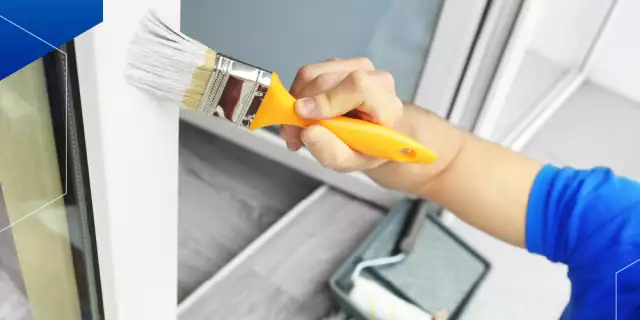
How to Start a Plumbing Business: 9 Tips for Growth



If you’re looking to start a plumbing business, it’s the perfect time to get with the flow. Industry research shows that the US plumbing industry includes over 130,00 businesses (and more than 500,000 employees) with total annual revenues exceeding $130 billion. It’s an excellent time to consider starting a plumbing company, as both the residential and commercial sectors are experiencing a wave of new construction, and that means opportunities for plumbing companies, which are expected to grow revenues by more than 1% annually for the next five years.
Moving from working as a plumber to starting your own business may seem like a lot of (water) pressure, but it doesn’t have to be. Establishing a business legally is a straightforward process, and creating a plan for growth is exciting. As you get deeper into the process, you’ll get to tackle challenges with cash flow, marketing, hiring, and more.
We’ve covered everything you need to know in our guide, so keep reading to get a handle on the key steps to take when starting a business as a plumber.
1. Get registered, licensed, and insured before anything else
Handling the fundamentals is like putting together a pipe diagram: It sets you up for success later. Starting a business starts with the legal and logistical nuts and bolts that get you ready for growth later on.
Here are a few key steps to make sure you cover:
Once you’re registered, licensed, insured, and financially prepared, you’re ready to start thinking about how to grow your plumbing business from the ground up.
2. Make a growth plan to stay focused on your goals
The first step in growing your plumbing business is to create a plan to grow. Start with your business plan – if you didn’t have a business plan when you started your plumber’s business, now would be a good time to write it down. Below, we’ve listed some items your business plan should definitely include.
Set goals for your business
Goals may include the revenue you want to generate over the next five years, the number of new jobs you will take on, or targets for hiring employees. The clearer you can be with your growth objectives, the easier it is to determine what resources you need in order to accomplish them.
Get clear on your customers
Are you going to specialize in a specific niche, or diversify your client base? Will your business focus on residential customers or commercial plumbing projects? The audience you are trying to reach — and the types of plumbing jobs you want to take on — will determine your marketing strategy and hiring requirements, as well as other business decisions.
Analyze your competition
Once you’re clear on your goals and the types of plumbing projects you’re going after, look at what your competition is doing. What kinds of jobs are they bidding on? How can you differentiate your company from existing businesses?
Action item: Create a growth plan for your plumbing company. Why it matters: Avoid the most dangerous business error of all: “Failing to plan is planning to fail.”
3. Keep the cash flowing through your financial pipes
Here’s a little-known fact about growing a plumbing business: It can be incredibly cash-hungry. If you start growing without proper financial management, you will quickly find your company out of cash and in bankruptcy court. That’s not an overstatement: Cash flow is the number one reason why plumbing contractors fail.
In order to grow, a plumbing company must proactively manage cash flow. Since you’re a seasoned plumber, you know that payments can lag behind job completion — sometimes way behind. But your costs keep adding up, and you need cash on hand to continue hiring skilled plumbers, buying materials and equipment, and taking on more or bigger plumbing jobs.
To grow your plumbing business sustainably, it’s not enough to be a Master Plumber, you need to be a master of your cash flow.
Becoming a successful business owner means knowing when to delegate and when to stay involved. When it comes to cash flow, it’s important to always have your finger on the pulse.
Review your cash flow regularly
If you have an accountant, work with them to create a real-time view of your cash flow that you can check at any time. Even without a dedicated accountant, you can use a cash flow forecast to predict your cash needs for the upcoming week, month, or year. Revise your projections to include actual expenses and revenue to make sure your model is accurate.
Modern construction accounting software can take into account expenses, accounts payable, and accounts receivable to help you spot cash flow problems before they sink your business.
WATCH: How to calculate cash flow for a construction project
Use cash flow to inform your business decisions
When making financial decisions for your plumbing business, operate with certainty rather than assumptions. Cash flow predictions and analytics are useful, but you’ll also want to lean on cash flow statements from past months and years that give a true picture of how your plumbing business is doing.
Beyond staying on top of cash flow as an owner, you’ll also want to make sure that you develop operational excellence among your team as your business grows: prompt invoicing, strong payment terms, and efforts to drive down costs where possible.
Action item: Evaluate a recent cash flow statement and develop a real-time cash flow dashboard. Make it a priority to check in on your business cash flow at least weekly.Why it matters: If your business is cash flow negative, it doesn’t matter if you have significant revenue coming in down the line. Growing and maintaining your plumbing business means having positive cash flow to expand your workforce and take on new jobs.
4. Set pricing carefully — don’t get caught in the ‘P’ trap
While cash flow is critical for survival, profit is essential for growing a plumbing business. Your profit is the money you will use to reinvest in the business for continued growth. Too many plumbers fail to price their services correctly, either aiming too high to attract customers or too low to maintain profitability.
Read more: The profit roadmap for contractors
For many business owners, nailing down the right pricing structure feels like a mystery, and some resort to simply copying competitors in hopes of success. But here’s the truth: Plumbing businesses charge wildly different rates (from $45 to $200 or more per hour), and you need to figure out the price that will work for your business.
Your prices are going to depend on your region, whether you’re doing commercial or residential plumbing work, and your specialization. Fortunately, getting the price right isn’t difficult, and you only have to follow one simple rule: The customer has to cover every cost. To avoid getting caught in the “P” trap (without any profitability), you need to think carefully about overhead.
When you’re just doing individual jobs, it’s easy to forget about the cost of doing business — but when you’re running a business, you need to remember that every job you take on needs to cover overhead as well. In addition to materials and labor for plumbing jobs, you need to cover the cost of staff, offices, benefits, and more.
Oh, and you do want to make a profit, right? Your pricing needs to take all of this into account. The average profit margin across the plumbing industry is around 5%, but you may adjust that number higher or lower depending on your business needs.
Keep reading: Contractor’s guide to profit and overhead
Action item: Take a look at your current hourly rate and billable hours, then determine whether they are actually covering your costs and working toward making a profit.Why it matters: Too many businesses fail because they undercharge or overprice their services. Make sure you know the real cost of running your plumbing business and price accordingly.
5. Hire & retain employees that lay the groundwork
Your employees are the face of your plumbing business, which means that whoever you hire will represent your company in front of your customers. Successful business owners put their people first because a thriving team leads to a growing company. Plumbers know that pipes are the groundwork of any successful building project, so find employees that will build a strong foundation for your business.
Update your benefits package to remain competitive
The more you can offer potential employees, the better employees you will attract. Strong health benefits, retirement plans, and leave policies may seem like high costs, but the value of productive employees can quickly outweigh the initial investment. Hiring, training, and developing an excellent team is the best investment you can make in growing your plumbing business.
When your employees consistently treat your customers with respect and demonstrate professional knowledge, growth comes naturally. Also, when you invest in your employees, they’re more likely to stick around, helping you to keep turnover low and engagement high.
Provide training opportunities
Create onboarding procedures for every position that orients new employees to skills as well as company culture. While standardizing training for plumbers is important, don’t forget about your back-office employees. Make sure your office staff has access to tools and courses that help them do their jobs more efficiently.
Training doesn’t have to be expensive. Levelset’s Payment Academy offers free courses on collections and credit, construction financial management, and more.
Make it clear how employees can grow from the start. Rather than providing a job, open up a career path for everyone who works in your plumbing business. Strong employees are attracted to growth opportunities, so provide incentives and promotions for performance to everyone who works for you.
Action item: Look at your processes for hiring, training, and development to identify areas for improvement. Why it matters: Employees are the single greatest asset of any plumbing business. Treat them accordingly.
6. Build consistent policies and procedures for your business
As your business grows, you’ll have less direct involvement in the day-to-day operations of the company. Too many business owners try to fight fires or manage every aspect of operations, but this is a recipe for burnout and stagnation.
Instead, you need to optimize your operations by building great processes, writing them down, and trusting your employees. Take all that you’ve learned about plumbing, sales, and more — and add in knowledge from your employees. Use this accumulated experience to standardize how your team handles calls, evaluates customer creditworthiness, and manages repairs and installations.
You need to have clear, written instructions for every company process. A policy serves three purposes:
Trust your employees
Once you have standard procedures, let your employees follow them. Too many business owners try to micromanage, but this approach is rarely successful. Instead, refine your procedures over time and use ongoing training to empower your employees to handle every situation.
In the end, your business is a collection of many different processes — from simple phone greetings to deciding whether to file a mechanics lien for non-payment. Having clear, unified processes for every aspect of your plumbing business improves productivity and prevents knowledge from disappearing when employees leave your company.
Action item: Identify processes that need standardization, write out clear instructions for those processes, and keep going until you have documentation to handle (nearly) every aspect of your plumbing business.Why it matters: As you grow, you’ll have less direct control over your business. By crafting great processes, your wisdom stays in every aspect of the company even as your attention moves toward strategy rather than day-to-day operations.
7. Implement a high-efficiency marketing & sales strategy
You can have the best plumbers, office manager, and accountant on the planet, but if you don’t win jobs, your plumbing business will not grow. Build a sales and marketing team that understands your target audience — and what gets them to say “yes” to the sale.
On residential jobs, the homeowner is dealing with a potentially large outlay of funds and may be in a stressful situation — like a major home renovation or a burst pipe. You want your sales staff to act with empathy and understanding.
If your goal is to get more commercial or public jobs, you’ll need someone experienced in writing winning bids. Bidding on a private commercial project can be different from bidding on a government job — your team should understand the difference.
Both residential and commercial plumbing companies need to be able to demonstrate their value to potential customers by addressing their needs and maintaining professionalism.
Growing a plumbing business requires that customers know who you are and how to find you. Having a recognizable brand, a strong online presence, and an easy-to-use website are all vital for growth.
According to Findstack, 72% of people use Google reviews to find businesses, and those with at least 200 reviews generate twice as much revenue on average. As a residential plumbing business owner, you need to recognize that the majority of your marketing efforts must go toward optimizing for Google searches, which is where the majority of your potential customers are likely to find you when they’re looking for help with small service jobs or large remodeling projects.
Optimize your website
Either hire an outside agency or an internal specialist who can help you rank in Google for relevant search terms, like “plumber in X city.” You’ll want a strong domain name (www.yourdomain.com), well-written marketing copy, and perhaps even a regularly updated blog with information that supports potential customers.
You can have your business show up in Google Reviews and on Google Maps by signing up for a business profile.
Your website needs to work well on both computers and mobile devices, have your contact information readily available, and include a contact form that is easily accessible. When your potential customers find your website from a Google search, make it easy for them to get information about your business and reach out to you.
Feature recent plumbing projects that highlight the types of projects you want to work on. Write up the project details, like problems you solved, your standards of cleanliness during construction, and the communication process with the project owner.
Create a recognizable brand
Beyond optimizing your website and working toward better rankings on Google, you’ll want to make sure that you have a strong brand. Considering your business’ colors, logo, slogan, name, uniforms, trucks, and more can make marketing easier — and make it easier for your business to spread by word of mouth.
If people know about your business, you’ll get more business. Once you’re an established name in your area, marketing becomes easier, but it never loses importance. Staying ahead of the competition means continually reaching out to potential customers and positioning your plumbing business as the best solution to their needs.
4 techniques for closing sales
Here are four ways that strong plumbing businesses get the sale for both repair work and new installations:
The majority of your customers are looking for you online, so making sure you stand out there is critical for business success. And it’s not just important for residential jobs — even developers and general contractors will look up your website as part of their prequalification process to determine your ability to complete a commercial plumbing job.
8. Know the laws that apply to your plumbing business
Construction law is complex, and plumbers have a lot of rules to follow. Failure to comply with building codes and other regulations can result in project delays, steep financial penalties, or a loss of your contractor license.
In addition to property rules, plumber’s licensing requirements, and other laws, you also need to be able to read and understand your construction contract thoroughly. If you’re not careful, you may end up agreeing to contract terms that delay payments or hurt your business financially. Someone at your company should review every contract — even better, hire a legal team to do it for you.
9. Become a more capable leader
Becoming a strong leader for your business is an important step if you want to grow. Business leaders with a clear vision, strong communication, and deft organization are able to overcome challenges and make wise decisions as they grow.
Many plumbing business owners started out as plumbers or supervisors. The upside of that path is that you have excellent background knowledge about the industry that can inform decisions about materials, techniques, or sales. On the other hand, very few people are natural-born leaders, and working as an individual plumber doesn’t always offer the opportunity to develop leadership skills.
So start working on becoming a better leader right now.
Always keep communicating
As the business owner, it’s easy to get stuck in your silo—but it’s a mistake. Your plumbers, salespeople, customer service representatives, accountants, and more are at the front of your business and have the information you need. Take time to ask three simple questions: What’s going well? What isn’t? How can I help you?
Stay open to feedback
It’s easy to get caught in a rut doing business the way you’ve always done it. Be open to new insights by meeting with other business owners, attending classes, joining professional groups, and getting feedback from members of your team.
Never stop learning
Leadership skills develop over time and by incorporating insights from many sources. Listen to leadership podcasts, read leadership books, and take leadership classes with the intent to never stop growing as a leader.
The success of your business starts with your own success as a leader. Build from your strengths and work on your weaknesses to develop into a business owner capable of growing and expanding where you want to be.
Action item: Make a plan to become a better business leader this year. Why it matters: Your plumbing business’ success starts with you. Leadership skills take time to develop, and these skills will help you gain the insights you need for continuous growth.
less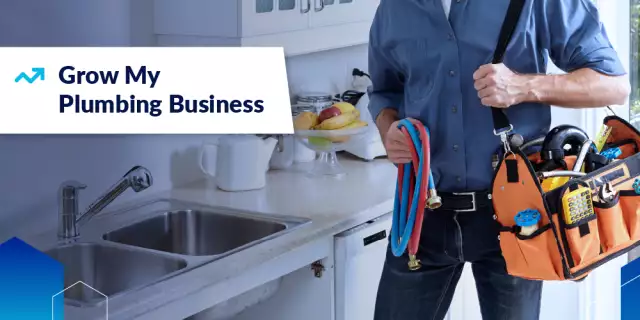
How to Start an Electrical Business: 9 Tips for Growth
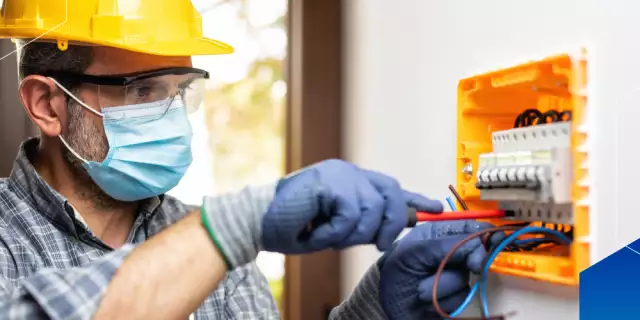
Ohio Demolition & Revitalization Construction: What’s Getting Funding & How Contractors Can Benefit



With the announcement of its new budget for 2022-2023, Ohio is taking a huge step forward with state-funded development and infrastructure buildup. Governor Mike DeWine has approved a staggering $3.5 billion in funding for community projects across the state both in the public and private sectors, including the new Ohio Building Demolition and Site Revitalization Program.
A large amount of that funding is set to be allocated to individual counties and state agencies, meaning that keeping an eye on what opportunities are headed where can help contractors who are hoping to maximize their opportunities.
Demolition and site revitalization at the heart of improvements and funding
$500 million of the newly-announced funding is for various development programs, including the aforementioned Building Demolition and Site Revitalization Program. This program will include $150 million for the demolition of vacant or abandoned commercial or residential buildings, with all 88 counties being eligible for grants to pursue demolition projects. The first round of funding ended up with $42.1 million in allocations to 87 of the state’s 88 counties, with the rest to be released on a “first-come, first-served” basis.
As law firm Tucker Ellis LLP observed, the state of Ohio’s 2022-2023 budget dedicates a historical amount for brownfield funding — alongside the $150 million intended for demolition projects, the budget further allocates $350 million total for the investigation, cleanup, and revitalization of other brownfield sites.
A number of contractors are already taking advantage of the situation and advertising their availability for demolition projects.
Public and private projects receiving funding
The budget also includes allocations for a number of public works opportunities that could beneficial to contractors in the state:
State funding isn’t only going to be directed to public works projects, as private entity Intel is likely going to receive around $1.1 billion from the budget in order to fund major new construction projects in the state.
See Intel’s Ohio Semiconductor Factories: Project Guide for Subcontractors
“Ohio is going to be benefitted in many ways,” DeWine said of the state’s intended support of the company. “Intel tells us they have Ohio residents who work at Intel and they’re dying to come back…There will be a number of Ohioans who will be hired.”
Ohio grant funding: How to apply & important contacts
Clean Ohio Program
The Clean Ohio program — which has served as a funding source mainly focused on environmental improvements, specifically — will continue to operate alongside the newer programs, though on a smaller basis.
Entities can apply for Clean Ohio grants via the state’s public works agency.
Building Demolition and Site Revitalization Program
It’s important for contractors to note that funding for this program is going to be claimed individually by county officials, making understanding of county needs and communication with county officials a must for any contractor hoping to take on local demolition needs in the state.
Though it isn’t required during the process for applying for further funding from the Building Demolition and Site Revitalization Program, counties may also optionally look to establish a subrecipient agreement with contractors prior to submitting an application (and thus prior to funding being awarded), reinforcing the importance of up-front communication.
You can view the Ohio Department of Development’s guidelines for the Building Demolition and Site Revitalization Program here.
Any questions related to the Building Demolition and Site Revitalization Program can be directed to Ohio’s Development Public Information Officer Megan Nagy at megan.nagy@development.ohio.gov.
Questions about any of the individual grants can be directed to the entity receiving the funding. If you’re wondering how much funding your county has been allotted in the first round of distribution, see a complete list here.
less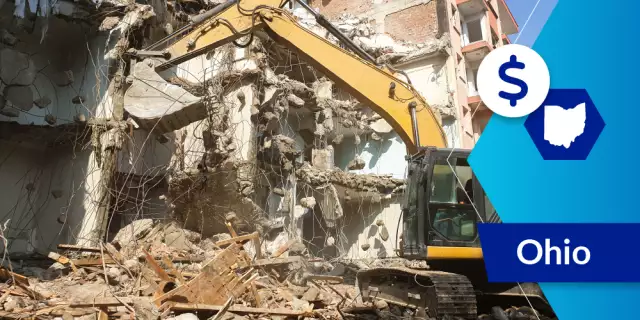
Bigger, Better Jobs: Tips for Getting the Jobs That Help Grow Your Business



There is no shortage of work in the construction industry right now. Yet, upfront costs are barriers for many specialty contractors interested in taking on more significant projects but face the challenge of waiting on payment from past jobs.
Delayed payment is felt by nearly 90% of contractors, according to Levelset’s 2021 Construction Cash Flow & Payment Report.
While most specialty contractors aim to take on jobs with higher profit margins, buying materials upfront can drain the available cash needed to make this happen.
Bidding on better jobs necessitates a business model that prioritizes growth and provides the ability to scale quickly. These tips can help specialty contractors get better jobs and grow their businesses.
The solutions
Understand the financials
It’s tempting to only budget for the substantial costs at the start of a project without planning how to handle the later stages. That’s not the most effective way to access more significant projects, especially as the industry faces high material costs and extended lead times. Breaking down project expenses is crucial before taking on one job or multiple projects. Learn more about construction financial management with this free course.
Bid bigger
The lowest bids aren’t always the best ones. Before bidding on a potential project, research is vital. Under-bidding can lead to cash flow issues down the road, so be sure your prices align with the work and services you plan to provide. Learn more about the high cost of low bids in this helpful article.
Strengthen vendor relationships
Vendor relationships are vital to getting the supplies you need for your projects. Unfortunately, we know that waiting for payment from past jobs can cause a trickle effect in the construction payment pipeline. A customer not paying on time directly impacts specialty contractors’ ability to pay their vendors on schedule, creating a cash flow domino effect. One way to improve vendor relationships is by discussing terms and offers upfront. Learn more tips about strengthening vendor relationships, which helps with long-term growth.
Use Materials Financing
Covering upfront costs at the start of a project too often stunts business growth for specialty contractors. Slow payment has become acceptable in the industry, but this norm does not benefit business growth or bigger bids. Materials Financing is a cash flow tool that allows specialty contractors to get materials at the start of a project and pay for them up to 120 days later. Learn how this contractor grew his business during the global pandemic using Materials Financing.
Specialty contractors work hard to keep their businesses on track, and these tips can help them gain insight or strengthen what they already have in place. Growing a business comes with great responsibility, but it also comes with access to great partnerships.
To learn more about how Levelset can help you get paid faster, be sure to connect with our team.
less
How to Get Paid on Georgia Public Projects



As a major focus of the Biden administration’s Build Back Better plan, the federal government is allocating over a trillion dollars in funding for public infrastructure construction projects over the course of the next decade. A big amount of that construction funding is going to be headed directly to individual states, and there are plenty of opportunities for contractors to benefit from Georgia public projects.
With this much work available, contractors across the state would benefit highly from being ready to take advantage of these new opportunities — and being completely prepared to protect their payment rights while doing so.
Popular thinking in the construction world is often that public projects run into fewer payment problems than private ones do, but that often proves itself to be a misconception: Even when public works projects are a major source of benefit, contractors are at just as much risk of slow payment or nonpayment as on any private project. Protecting your payment rights on public works projects is absolutely crucial.
Payment protection on Georgia public projects
Even though payment challenges can be remarkably similar, payment protection is very different between private and public work. When payment problems come up on a public project, contractors can’t just file a mechanics lien as a solution, as both the federal government and state governments prohibit private companies from gaining interest in public property.
Instead, general contractors on public construction projects have to secure a payment bond for the project prior to the beginning of work. In the event of a payment dispute, contractors file claims against the payment bond instead of against the property itself.
The Miller Act provides directly for this payment protection at the federal level, and most states have their own version of it with laws usually called “Little Miller Acts.” Georgia has its own Little Miller Act which protects contractors on public works projects — as long as they stay on top of their payment rights in the process.
Working nearby? Check out How to Get Paid on Florida Public Projects.
Georgia bond claim laws
Georgia’s Little Miller Act covers all projects valued at $100,000 or more, although a bond may be required for contracts that are less than $100,000 at the public entity’s discretion.
This law includes expansive protection for unpaid contractors on public projects — parties who supply labor and/or materials to the general contractor, a subcontractor, a sub-subcontractor, or another supplier are protected under the state’s bond claim law. Even suppliers to suppliers are likely covered.
Georgia Notice of Commencement
Georgia requires that a Notice of Commencement (NOC) is filed on all construction projects in the state. A Notice of Commencement is a form publicly filed in the county records to signify that a construction project has begun, including information that identifies the property, the work, the parties involved, and the scope of the project, and it can be filed by either the public entity or the project’s prime contractor.
However, it’s important to note that the Notice of Commencement has specific legal consequences for a lot of people working on a project. When a Georgia NOC is filed, subcontractors and suppliers must then deliver a Notice to Contractor when they start on the job. This gives property owners and general contractors notice that these parties are working the job, making it easier to track payments to them and collect waivers from them. If the Notice to Contractor isn’t properly sent, then the applicable party loses bond claim rights.
On the other hand, when a Georgia Notice of Commencement is not recorded, all subcontractors and suppliers to the job automatically have the right to make a claim against the bond, and are no longer required to deliver any preliminary notices.
Learn more: What Is a Notice of Commencement? (Forms & How To File)
Georgia preliminary notice
Georgia requires all parties who don’t have a direct contract with the general contractor to provide preliminary notice — also referred to as a Notice to Contractor. This notice preserves the right to make a bond claim in Georgia if the general contractor has properly filed and posted a Notice of Commencement. With that said, subcontractors hired directly by the project’s prime contractor don’t need to send any preliminary notice.
On public construction projects, preliminary notices must be received by the general contractor within 30 days of the filing of the notice of commencement, or within 30 days of the claimant’s first furnishing of labor and/or materials to the project (whichever is later). As mentioned prior, if a party fails to serve a required Notice to Contractor before the deadline, they lose the right to make a bond claim in the event of payment issues. However, if a Notice of Commencement was not properly filed on the project, then the sub-tier bond claim rights are not affected.
Georgia statutes don’t specify how the preliminary notice needs to be delivered to the general contractor, and a method of delivery with proof of receipt is usually best practice. Sending the notice by certified or registered mail is likely the best route.
Making a claim against a payment bond
Bond claims must be received within 90 days after the claimant’s last furnishing of labor and/or materials to the project. Delivery of notice of the bond claim is only specifically required when parties have no direct contract with the general contractor. Best practice in all situations, however, is likely for all parties to provide notice of the bond claim to start the process prior to initiating suit.
In Georgia, a bond claim only needs to include the amount of the claim and the name of the party to whom the labor and/or materials were furnished. That said, it’s usually also advisable to include the information of the general contractor (if the claimant was hired by a lower-tier party), and the contracting public entity, as well as including a description of the project and the labor and/or materials furnished.
The claim can be sent via registered or certified mail, or by personal service or other manners seen as acceptable for service of process. Additionally, Georgia bond claims only need to be delivered to the general contractor, but they can optionally be delivered to the surety if desired by the claimant.
If a suit to enforce the bond claim is filed, it needs to be initiated more than 90 days after the claimant’s last delivery of labor and/or materials to the project, but less than 1 year after the completion of the project as a whole.
Lien waivers
One of only 11 states to do so, Georgia statutorily mandates that all parties on a construction project use certain legislatively designed construction lien waiver forms.
If a contractor or owner asks you to use a lien waiver form that does not conform to the statutory form, the waiver will be invalid, and the contractor could get in legal trouble. As part of this, Georgia state law prohibits contractors and suppliers from waiving their right to file a mechanics lien in the contract.
Deep dive: Georgia’s Very Unusual Rules for Mechanics Lien Waivers
Georgia prompt payment laws
Prompt payment laws regulate the acceptable amount of time in which payments must be made to contractors and subcontractors on public works projects, which ensures that everyone on a project is paid in a timely fashion. Georgia’s prompt payment laws regulate payments from every tier of the construction payment chain.
In order to benefit from the state’s prompt payment act, the requesting party must first be considered as entitled to payment. All contractors and subcontractors need to perform in accordance with the provisions of the contract, satisfying any conditions precedent to payment — which in turn makes the enforceability of the prompt payment act completely dependent on the individual contract terms.
It’s also necessary for subcontractors to provide notice with payment requests, as the benefits of interest being accrued and potential attorney’s fees being covered are lost if this isn’t provided. A notice citing the statute and the interest rate provisions should be included at the time of submitting the pay request.
Public entities are required to pay their prime contractors within 15 days of receipt of a project invoice or pay application. With payments from the general contractor to their subs and suppliers, the prompt payment deadline begins upon receipt of the payment from the owner. When the project’s general contractor receives payment, they need to then pay their subs and suppliers within 10 days; this same time limits apply to payments from subs to their subs and suppliers as well.
Additionally, receipt is defined in the statute itself, which means that the time limit revolves around actual receipt of funds in the contractor or sub’s bank account — leaving less confusion around the particulars.
Retainage works just slightly differently, with the main difference impacting the prime contractor. Once the project has reached substantial completion, the public entity needs to pay out withheld retainage within 30 days after receiving an invoice for final payment. In turn, once received, contractors must release retention funds down the chain within 10 days.
Georgia’s Prompt Payment Act provides a list of certain circumstances in which owners and general contractors can withhold payments:
Any payments that are late or withheld improperly are subject to penalties. Interest accrues on the payment amount at a rate of 1% per month or a pro-rata fraction on the unpaid balance. However, this interest rate will not accrue unless the person being charged interest was notified of this at the time the payment request was made. Additionally, contractors may agree to other payment terms and lesser interest rates if they so choose, but, if a party materially breaches these contract terms, the interest rate will revert to the statutory 1%.
Georgia retainage laws
Retainage (or retention) is an amount of money withheld from payment to a project’s contractor or subcontractor until the end of a given project (or until a time specified in the contract). Generally, retainage is used to ensure that a contractor finishes its work completely and correctly.
Georgia’s retainage laws apply to almost every type of public construction project in Georgia, with the only exceptions being projects contracted by the Georgia Department of Transportation or any public works contracts whose value is less than $150,000, or projects where the duration is less than 45 days.
For all applicable public projects, the maximum amount of retainage that is allowed to be withheld from contractors is 10%. However, this could change when the entire contract value has reached the 50% completion mark; at this point, the public entity may decide to stop withholding retention from any future progress payments if it feels like the work done thus far is satisfactory.
On the other hand, if the public entity decides that the work being done is unsatisfactory or the contractor has fallen behind schedule, it can choose to continue withholding retainage after the 50%-completion mark (though this amount will be limited to 10% as before).
It’s important to note that recent changes have affected this, too. Effective for all contracts entered into on or after July 1, 2022, retainage on public projects is capped at no more than 5%, with no automatic reduction at the 50% completion mark.
This can have a trickle-down effect for all of the contractors on a project, depending on the situation: If the public entity is withholding retention, the prime contractor can then withhold retainage from their subs and suppliers. In these situations, the rate withheld cannot be any more than what the entity is withholding from the prime contractor.
If there are still outstanding retainage payments when the project is nearing closeout, then once the prime contractor submits their invoice for final payment upon substantial completion, the public entity then has to pay the rest of the retainage within 30 days of receipt.
Recent changes to the state’s retainage laws have effects here as well. For all contracts entered into on or after July 1, 2022, subcontractor retainage may be released separately upon completion of their portion of the work at the discretion of the public entity and following approval from the general contractor.
Georgia’s retainage laws for both public and private projects don’t provide any specific penalties for nonpayment of retainage, but the state’s prompt payment laws instead treat retention payments like any other payment on a public works project that is held back.
Protect your payment rights on every public project
Though there are a number of guidelines that need to be followed in order to secure payment rights on public projects in Georgia, going the extra mile to protect your payment rights can help to ensure that you’ll receive the right payment for your work in any situation.
Even though preliminary notices are required for many contractors on public projects in Georgia, it’s important to file them as early as possible in order to ensure that bond rights are maintained. Even beyond maintaining these rights, sending a preliminary notice maintains a line of communication throughout the chain on a construction project, giving all contractors involved the opportunity to make sure that payment disputes are taken care of earlier on in the process rather than later.
When a company is dealing with documentation like what is needed for preliminary notices and bond claims, proper document retention and management is an absolute necessity when it comes to protecting your payment rights. Especially when sending notices and maintaining the proper documents needed for claims, it can be enormously beneficial for you to have an organized policy for document retention.
less
How to Get Paid on Oregon Public Projects

Does a Lien Affect Your Credit Score?
